Admissions
Looking for a small, close-knit campus filled with incredible, hands-on learning opportunities? Our Admissions Office can help make Elmira College YOUR place.
Welcome
About EC
Getting Started
Academic Resources
Apply to EC
Visit Campus
Tuition & Financial Aid
Campus Life
Outcomes & Careers
Athletics
Alumni

Grounded in the liberal arts and sciences, Elmira College provides a collaborative and supportive environment that enables students to become active learners, effective leaders, responsible community members, and globally engaged citizens.

The legacy of academic excellence at Elmira College runs deep with a heritage and culture that have been forward-thinking from day one, as the first college for women with a course study equivalent to men's.
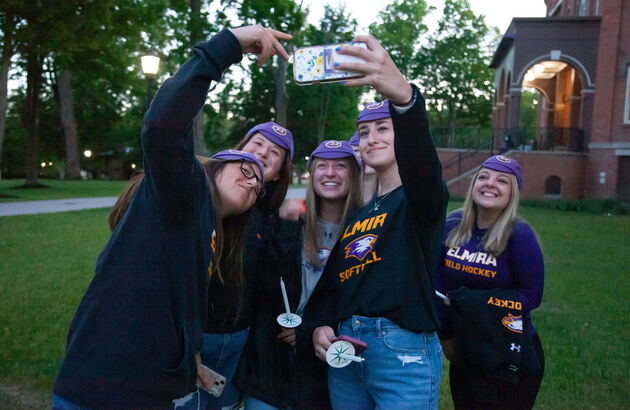
At Elmira, you’ll have opportunities that shape your future, raise your sights and equip you with targeted tools and skills to succeed in the professional world. Join a community that’s close-knit, fun-loving, and just the right amount of quirky.

Elmira College makes a private education more affordable than you realize, with a number of ways to get the financial assistance you may need. Our financial aid office can guide you through options, including scholarships, grants, loans, and work-study programs.
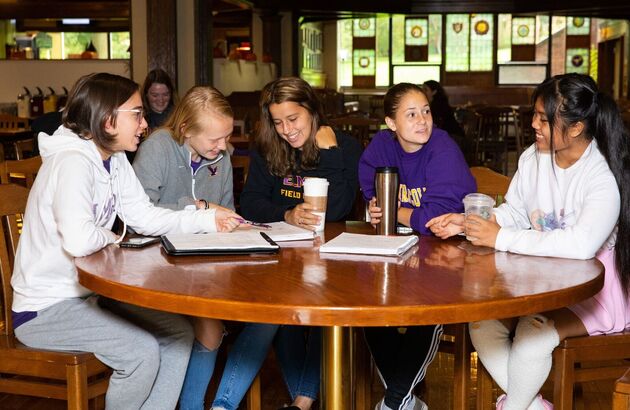
Elmira College includes meeting students from around the world, participating in Elmira traditions, completing community service projects, and hopping into a pickup kickball game.

Elmira College provides you with a foundation for future success.

The home of the three-time NCAA National Champion Elmira College Soaring Eagles.

Elmira College alumni stay connected and engaged with the College long after they graduate.

Gifts to Elmira College ensure excellent academic and co-curricular opportunities for generations of EC students.
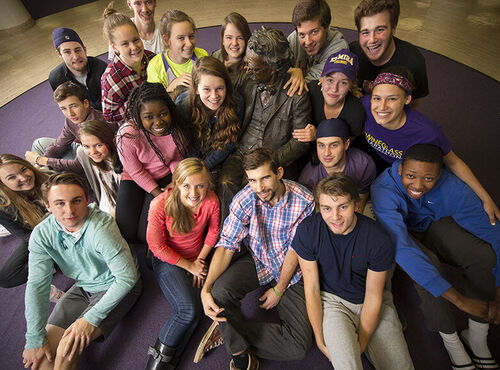
Looking for a small, close-knit campus filled with incredible, hands-on learning opportunities? Our Admissions Office can help make Elmira College YOUR place.

Internal dashboard for EC news, events, resources, and more. Log-in required.

Check out our news section to learn about all that's going on at Elmira College.
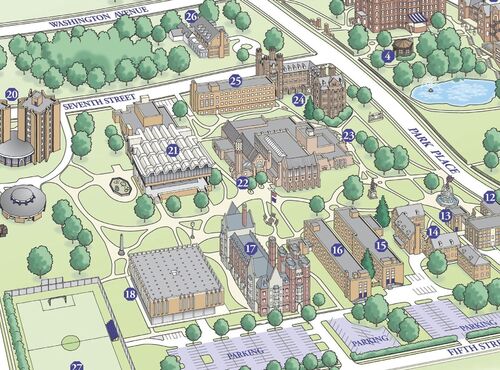
The EC campus map can help you find your way around campus and find the best parking spot.
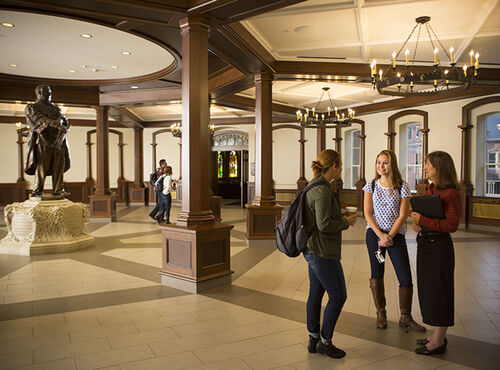
With over 35 majors and minor areas of concentration, Elmira College lays the foundation for a diverse, cross discipline education, encouraging you to both specialize and explore.
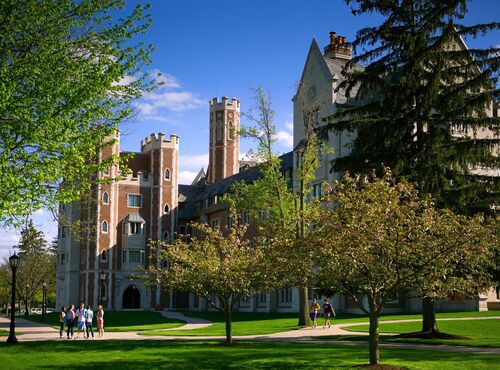
Looking for registration deadlines, spring break or when grades are due? Our academic calendar has all of the important events for this academic year.
Info For



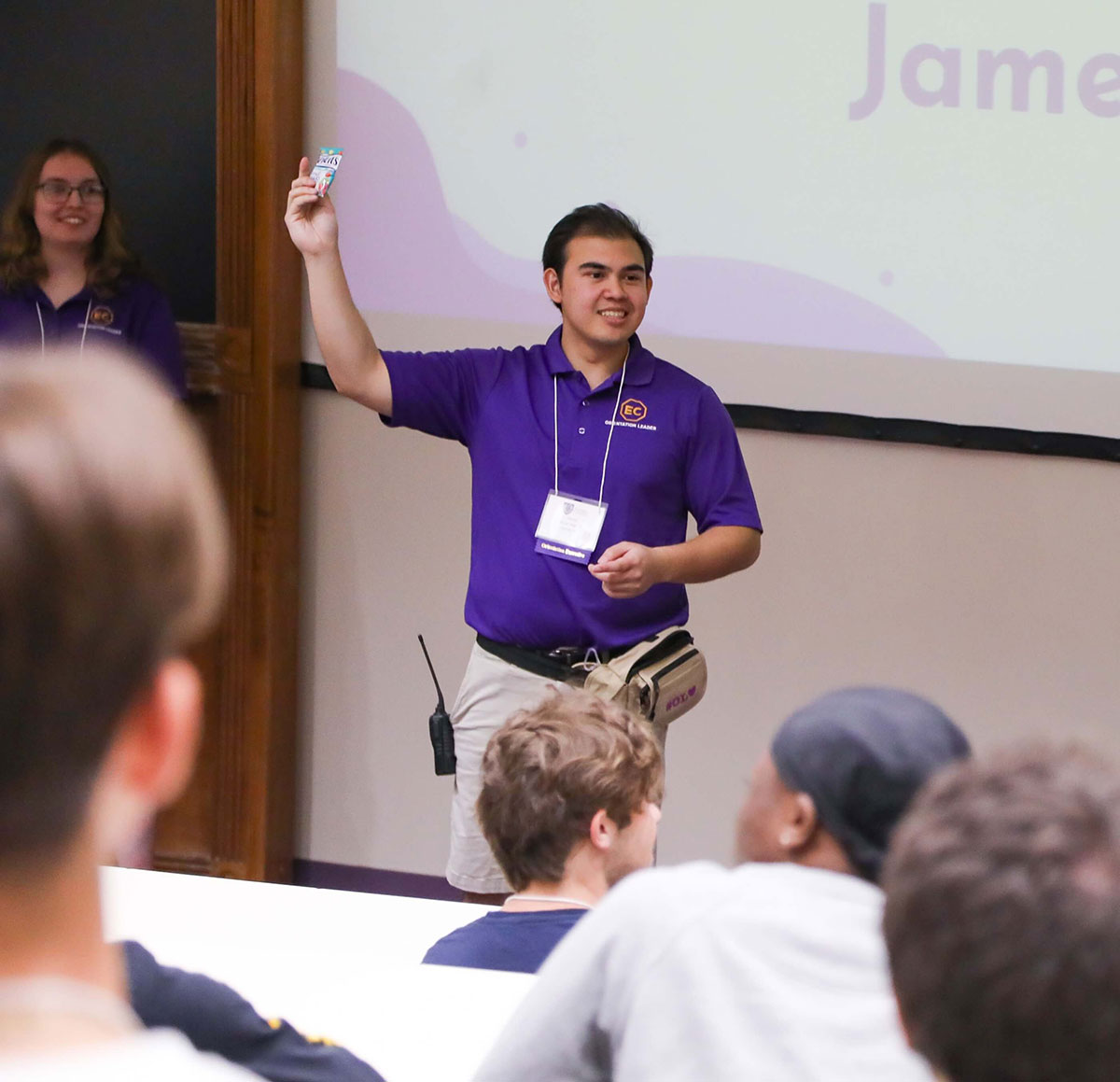
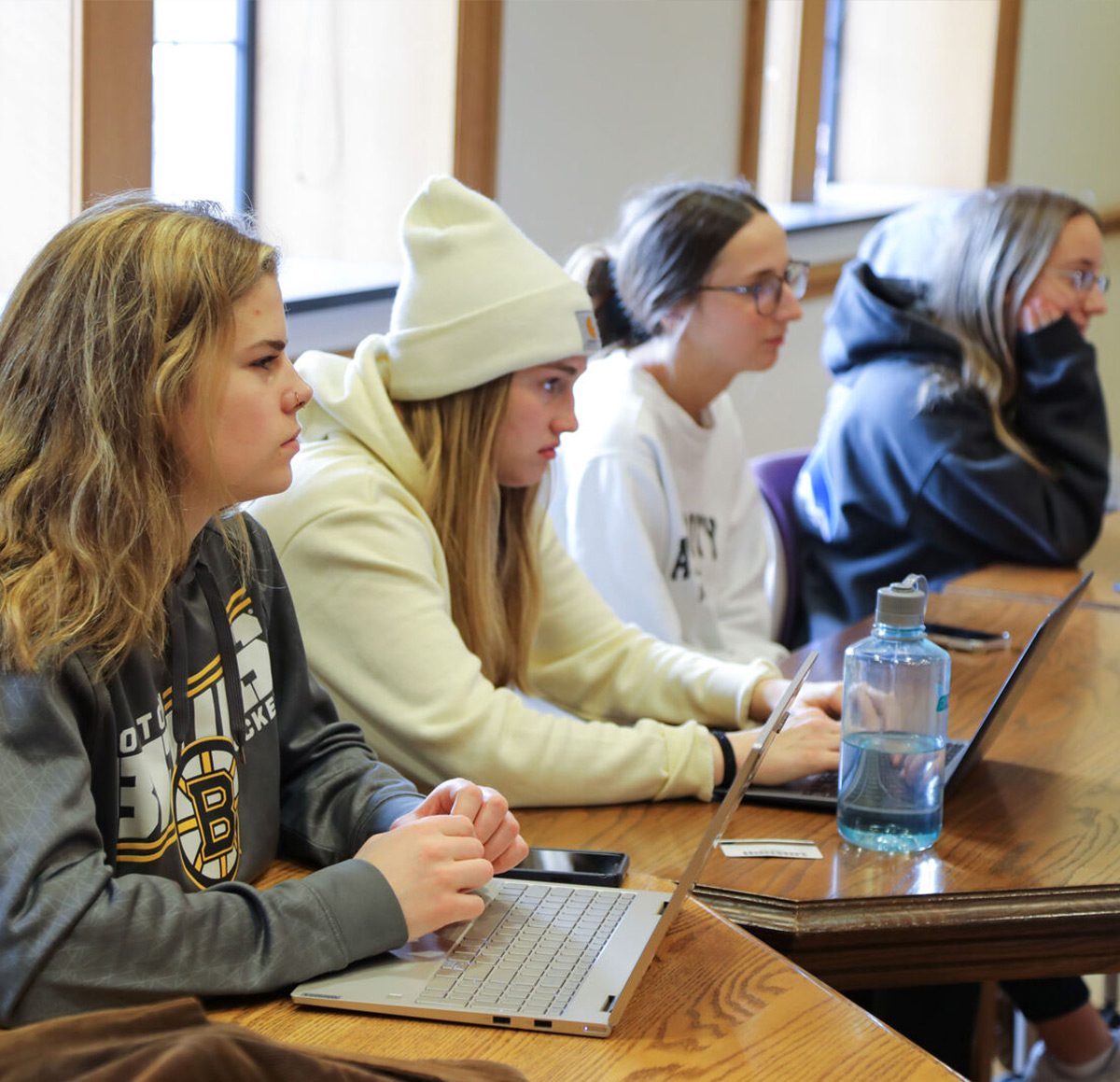
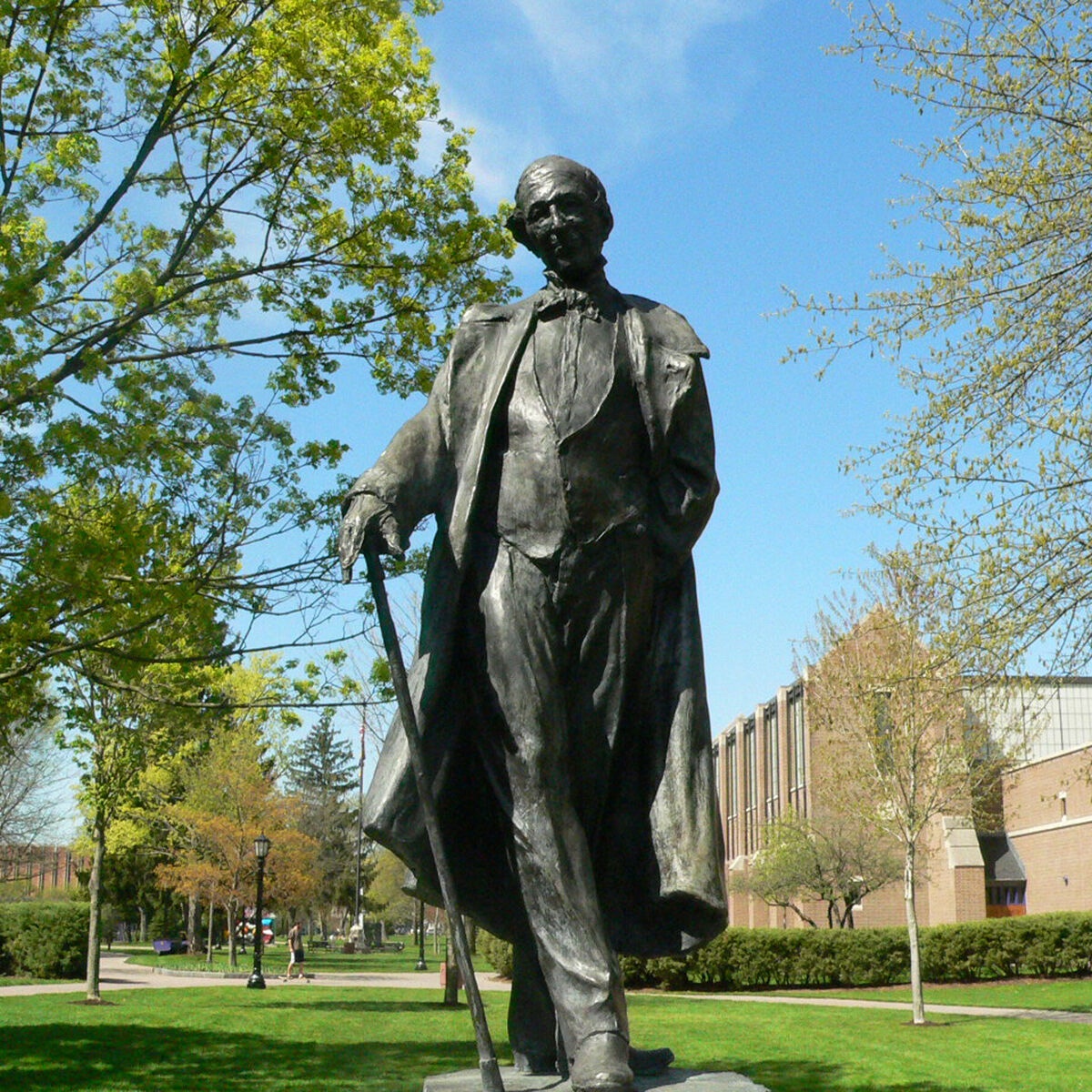




Elmira College strives to create a supportive learning environment where you can thrive and become the leader we know you are.
The Code of Conduct is vital to ensure a positive, inclusive, and robust campus community. Use the links below to download the current and previous Code of Conduct documents..
College Policies and Procedures | Parking Permits/Registration Policy | Elmira College Policy Statement on Alcohol | Policies and Prohibited Conduct | Conduct Referral | Academic Dishonesty | Policy Against Sexual Harassment and Other Sexual Misconduct | Students’ Bill of Rights in Cases Involving Sexual Assault, Domestic/Dating Violence, and Stalking
Students are expected to abide by applicable laws and College policies and to conduct themselves in accordance with the guiding principles outlined herein, at all times. Explicit in these expectations is that students are responsible for making their own decisions and will accept the consequences of those decisions.
The College, in general, will:
Authority over student conduct is vested in the Office of Campus Life, specifically the Chief Conduct Officer, who may take immediate action at their discretion for any violation of the College’s Code of Conduct. Action taken by the Office of Campus Life is final and closes the matter. The Chief Conduct Officer may delegate and exercise this authority consistent with the College’s Code of Conduct. The Chief Conduct Officer has the authority to take appropriate, interim actions to protect the safety and well-being of the Elmira College community.
The Office of Campus Life reserves the right to amend the College’s Code of Conduct, as deemed necessary, in which case the Chief Conduct Officer will notify the Elmira College community.
The College defines students as both graduate and undergraduate students, including clubs, organizations, and affiliated entities. Students must abide by the Code of Conduct from the time they are accepted to the College through their last date of attendance, and always while living in College-owned housing. A student who violates College policies or fails to uphold accepted standards is subject to conduct action. The student Code of Conduct applies to all properties owned, leased, or used by the College. Students are expected to abide by local, state, and federal laws. The institution will not provide sanctuary for those who violate such laws, and the College reserves the right to refer a student through the conduct process when a student has been charged with criminal violations. The College reserves the right to take conduct action for incidents that occur off campus that violate the College Code of Conduct and/or potentially could jeopardize the College’s image, and/or the health and safety of the College’s community. The College reserves the right to confiscate and dispose of any items which are deemed to violate the College’s Code of Conduct. The College reserves the right to search a student’s living space if deemed necessary.
All student conduct cases will be decided on the burden of proof standard of a “preponderance of the evidence” - which means the determination will be made on the basis of whether it is “more likely than not” that a student violated the Code of Conduct. This is often equated as “50.01%” or “50 + a feather”. The preponderance of evidence standard is also utilized to adjudicate incidents or situations that occur off-campus that fall under the jurisdiction outlined herein.
Elmira College supports the rights of all members of our community to express their views and to peacefully and lawfully protest against actions and opinions with which they disagree. Yet the right to free speech and expression is not absolute. The Supreme Court has made several exceptions to the expression of free speech, and some forms of speech may be limited, banned, or prosecuted. These include obscenity, defamatory speech such as libel or slander, threats of violence to a person or group of people, false advertising, and what are called “fighting words,” or speech that is meant to incite an immediate retaliation from the audience. Elmira College bans these types of speech. In addition, human and civil rights laws, including the New York State Human Rights Law and Title VI of the Civil Rights Act of 1964, demand that institutions maintain a harassment-free environment for all students and employees, specifically those who belong to one of the protected classes named in these statutes.
Elmira College students, faculty, and staff are expected to uphold the values that drive the College’s mission to provide a collaborative and supportive environment that enables students to become active learners, effective leaders, responsible community members, and globally engaged citizens. Each member of the Elmira College Community is expected to balance their right to freedom of speech with the need to maintain a civil and secure environment where faculty, staff, and students can freely exchange ideas and openly engage in deliberation, debate, and learning.
All members of the EC Community and visitors shall comply with this Policy. This Policy is considered part of the conditions of employment and participation in EC-sponsored events or programs. This Policy applies to speech and expression that takes place on the EC campus, at EC-sponsored events or programs off campus, and while employees and students are traveling and/or studying abroad. This policy also applies to speech and expression that occurs on electronic resources (e.g., EC computers and bianlifan.com email accounts) and EC-owned/maintained social media sites (e.g., Facebook, Instagram, and Twitter).
Members of the Elmira College community who do not conform to this policy will be subject to disciplinary action as outlined in the Student Code of Conduct (pgs 19-25) and Employee Handbook (pgs 69-73). Violating these terms may also open the speaker to legal action off campus.
Freedom of speech is a cherished and important part of American society and is central to the mission of higher education. Elmira College is committed to supporting speech of all sorts, including speech that might be seen as offensive or unpopular. However, the College is also committed to protecting the rights of members of its community to enjoy an educational experience that is free from harassment. From its founding, Elmira College has been committed to supporting its students’ rights to expression, debate, and the free and respectful exchange of ideas; it continues to support those rights today.
If Residence Life or Campus Safety staff members are contacted to provide emergency care to an intoxicated or impaired individual, the individual who sought assistance for another student may receive no sanction if during the process of seeking help they intentionally or unintentionally revealed the fact that they were also in violation of the alcohol and/or drug policy.
It is the policy of Elmira College to investigate any report of a missing student who is enrolled and attending classes. This policy, with its accompanying procedures, establishes a framework for cooperation among members of the College community aimed at locating and assisting students who are reported missing.
A student will be deemed missing when reported absent from the College (including trips and athletic events) without any known reason. All reports of missing students must be directed to Elmira College’s Office of Campus Safety at (607) 735-1777. Campus Safety, in collaboration with various Campus Life departments, will lead in investigating each report and decide whether the student is missing in accordance with this policy.
All students have the option to identify a confidential contact person or persons who will be notified within 24 hours in the event that a determination is made by the College that the student is missing. This contact information may be added through an online form found on MyEC. Only those authorized by the Vice President of Campus Life and Dean of Students, and law enforcement officers in furtherance of a missing person investigation may have access to this information.
If a missing student is under 18 years of age, and not an emancipated individual, the institution will notify a custodial parent or guardian of the missing student no later than 24 hours after the determination that the student is missing.
Elmira College will contact local police and other law enforcement agencies no later than 24 hours after the institution receives a report that any student is missing.
Given the various housing options at Elmira College, there is no formal procedure or prescribed timelines for monitoring whether students are present in their assigned student housing. Student welfare and safety is paramount to Elmira College; however, the institution recognizes and makes known its limitations in obtaining accurate and timely information on the whereabouts of students.
The Office of Campus Life shall have the responsibility to make the provisions of this policy and the procedures set forth below available to students.
Any report of a missing student, from whatever source, must immediately be directed to the Office of Campus Safety.
When a student is reported missing the Office of Campus Safety will:
1. Initiate an investigation to determine the validity of the missing person report;
2. Inform the Office of Campus Life;
3. Make a determination as to the status of the missing student;
4. Notify local police or other appropriate law enforcement agencies within 24 hours after the institution receives a report that the student is missing;
5. If the student is missing from a trip sponsored by the institution, the Office of Campus Safety, in collaboration with the staff member on the trip, will contact local law enforcement.
Upon determining the student is missing the Office of Campus Life will:
1. Notify the person(s) identified by the missing student as the confidential contact within 24 hours of making the determination that the student is missing; If the missing student is under the age of 18, and not an emancipated individual, notify the student’s custodial parent or guardian as contained in the institutions records within 24 hours of the determination that the student is missing;
2. Inform Senior Officers as needed; and
3. Initiate whatever other action is deemed appropriate under the circumstances to be in the best interest of the missing student.
The Office of Campus Life shall initiate whatever action is deemed appropriate under the circumstances to be in the best interest of the missing student.
In addition to having the option to identify a “confidential contact person” as provided in this policy, all students are asked to submit emergency contact information and update it yearly. The Office of Residence Life will verify and collect emergency contact information from residential students during fall move in.
The College now defines the residential student age range as ages 17-26. Any student requesting residency who falls outside of this age range will be considered on a case-by-case basis by the Office of Residence Life.
Students wishing to reside off campus must obtain prior and proper permission from the Assistant Dean of Students. If a student applies for off-campus residency and meets one or more of the following criteria, he/she may automatically be granted off-campus residency status for the academic year or term(s) for which he/she applied. The criteria are:
Bicycles may be brought to campus and must be stored overnight in the Meier Hall archway bicycle storage room, but may be kept at a bicycle rack during the day. Please contact the Office of Campus Safety to register your bicycle and have access to the bicycle storage room added to your Student ID Card. Elmira College does not assume responsibility for lost or damaged items stored in these areas. Bicycles should not be chained to fences, light posts, or other public property or placed in public areas of College buildings. If bicycles are found in these improper locations, they will be removed.
All students and staff are required to register any vehicle which they have at the College. Vehicles must be registered within 24 hours after they are first brought to campus. Applications for vehicle registration may be obtained at the Campus Safety Office located at 710 Park Place, Elmira, NY 14901 beginning on the first of August. All full-time students are required to park in College-provided parking lots.
The following requisites for registration must be met for a motor vehicle to be registered:
1. The applicant and the vehicle must meet all requirements prescribed by the N.Y.S. Vehicle and Traffic Law for legal operation.
2. The motor vehicle to be registered must be operated by the applicant and owned either by the applicant or a family member.
All parking on campus (except visitor areas) is by permit only. A parking permit (sticker) does not guarantee the holder a reserved space, only an opportunity to park within a specified area. Within each permit eligibility category, permits are issued on a first-come, first-served basis, and the College reserves the right to limit issuance so as to prevent exceeding the number of available spaces.
All vehicles except those with purple stickers (faculty and staff), must register annually with the College during the first week of Academic classes each Fall, or within one week of starting at the College. Parking stickers are valid only for the areas for which they have been specifically designated. They must be affixed (as designed) to a window on the driver’s side of the vehicle as far back as possible without being placed on the rear window/windshield of the vehicle. Parking stickers are not transferable. Lost or stolen stickers must be reported and replaced within 24 hours. The parking stickers issued by the College are the property of Elmira College.
Any changes, tampering with, or misuses of the stickers may result in the withdrawal of the stickers. Student Parking Stickers - permits valid in gold or any current decal lots only are issued to all students.
Parking in the following places is prohibited at all times:
1) On the sidewalk or a crosswalk.
2) On the grass or lawn.
3) In front of a driveway, doorway, or steps.
4) In front or rear of Twin Towers unless you have a handicap plate or won the Senior Auction parking spots.
5) In all service driveways, loading zones, and access roads.
6) Only people with a valid issued handicapped placard or state issued handicapped plate may park in handicapped spaces.
7) Reserved parking spots i.e. Residence Life, Facilities, Auction Winner, etc.
Also, no person shall park a vehicle on the grounds of the College in such a manner as to interfere with the use of a fire hydrant, fire lane, or other emergency zone; create any other hazard; or unreasonably interfere with the free and proper use of roadways.
Only authorized College vehicles and emergency vehicles (patrol cars, ambulances, fire trucks) are authorized to drive on the inner campus roadways and walks. Insurance and safety regulations forbid parking of automobiles, motor scooters, and motor bikes inside or under cover of any building or extension of such a building.
The fines may be imposed upon any person subject to these rules and regulations for any violations listed on the parking ticket. The registering of a vehicle at the College is held to constitute an agreement on the part of the registrant to abide by the College rules and regulations with regard to traffic and parking. All fines are to be paid at the Business Office located in McGraw Hall. Tickets not paid within ten days of issuance will be charged a $10 late fee.
The imposition of fines and penalties set forth above may be initially appealed to the Director of Campus Safety. Such appeals must be made in writing within three days of the violation by the registrant on an appeal form available at the Campus Safety Office. Appeals of the Director’s decision are made through the Vice President Campus Life and Dean of Students.
The Elmira Police Department enforces an odd-even parking ordinance on city streets. Under this ordinance the following parking restrictions apply for the entire year:
Between 2 a.m. and 7 a.m. on days with even numbers according to the calendar, vehicles may be parked only on the even (house numbers) side of the street.
Between 2 a.m. and 7 a.m. on days with odd numbers according to the calendar, vehicles may be parked only on the odd (house numbers) side of the street.
Note: this does not apply where parking is otherwise restricted by signs and where parking is restricted or prohibited on one side of the street for a full city block. Questions may be directed to the Campus Safety or Elmira Police Department Traffic Bureau, (607) 737-5640.
Reserved Handicapped Parking - Elmira College will only honor disability parking permits issued by the Department of Motor Vehicles or by Town Clerks.
Temporary Permits - permits valid in designated lots stated on the permit are issued to short-time staff and departments needing temporary parking in restricted areas.
Visitor Spaces - Parking spaces reserved for visitors are reserved 24 hours a day. Vehicles with current parking stickers are prohibited from parking in spaces reserved for visitors at all times.
Elmira College is committed to the education of students when it comes to the legal, responsible, and safe use of alcohol. The College seeks to maintain an academic environment that respects individual freedom and promotes the health, safety, and welfare of all members of its community. The College has established policies governing the consumption, possession, and sale of alcoholic beverages on its property, and which follow the laws of the State of New York. The College sponsors programs that promote awareness of the physical, psychological, social, and behavioral effects of alcohol consumption. The College also assists its members in finding alternatives to the use of alcoholic beverages for promoting social interaction and it provides services and resources for college students who are experiencing alcohol-related difficulties. Elmira College’s alcohol policy and programs are intended to encourage its students to make responsible decisions about the use of alcoholic beverages, and to promote healthy, legal, and safe patterns of social interaction. The consumption of alcohol has potential for abuse, and the College community will not tolerate inappropriate use of alcoholic beverages, regardless of the age of the student.
Our main obligation is to preserve an atmosphere conducive to study and personal growth. Each student has the right to quiet conditions in a residential living area, weekends included. Students are to behave in a manner which does not disrupt the residence hall or infringe upon the rights of others to study or sleep, bring discredit upon themselves or the College, vandalize college property, or interfere with the rights, freedoms, and safety of others.
Elmira College is committed to educating students on risk-reduction strategies related to alcohol and other drug usage. Elmira College staff will provide opportunities for students to develop a responsible approach to social challenges related to alcohol and other drugs. Additionally, the implementation of this policy will include campus-wide education on the symptoms of alcohol abuse, drug use, overdoses, etc.
If students are experiencing alcohol-related difficulties, Elmira College staff will assist students on campus and/or connect them with the appropriate external resources as needed:
1. Clarke Health Center: (607) 735-1750 or extension 1750
1. Alcoholics Anonymous: (607) 737-6733 or www.aa.org
2. Alcohol Treatment Center (24-hour hotline): (877) 478-5777
3. Arnot Health St. Joseph’s Hospital: “New Dawn” (607) 737-7802 (inpatient)
4. Trinity of Chemung County: (607) 737-5215 for treatment; (607) 737-5218 for prevention www.trinityofchemungcounty.org
1. Possession or consumption of alcohol by a person under the age of 21 is prohibited. Students 21 years of age or older may possess alcohol for their personal use in their own residence hall room/living space.
2. Students 21 years of age or older are not permitted to consume alcohol in the presence of someone under the age of 21.
3. Persons under 21 years of age are not permitted to be in the presence of alcoholic beverages, or beverage containers.
4. No open alcoholic container will be allowed on College premises except in residence hall rooms, suites, or apartments assigned to students who are at least 21 years old and do not reside with a student under the age of 21.
5. Alcohol may not be consumed in any public area. (e.g., the Fountain, fields/quads, building lobbies, hallways, or lounges, etc.)
6. Engaging in acts of public drunkenness, vandalism, disorderly conduct, harassment, or infringement of the rights or privacy of others.
7. The following are prohibited:
a. Activities or paraphernalia that encourage the rapid or mass consumption of alcohol, including large quantity beverage dispensers.
b. Overconsumption of alcohol.
c. Consumption of alcohol that requires medical evaluation or transportation to a medical facility.
d. Providing alcohol to an individual(s) under the age of 21.
e. Under the influence of alcohol.
f. Kegs, Mini-Kegs, or other large-quantity beverage dispensers intended for serving or storing alcohol.
The willful, intentional setting of a fire to a structure, property, or vehicle.
A criminal act that intentionally targets a victim based on the victim’s actual or perceived race, color, national origin, ancestry, gender, gender identity or expression, religion, religious practice, age, disability, or sexual orientation.
Bullying, which may be present in both cyber and physical spaces, is the infliction of physical, verbal, or psychological distress by teasing, threat, intimidation, stalking, physical violence, harassment, or destruction of property.
Conduct that threatens the health or safety of any person including, but not limited to:
1. Physical assault.
2. Threats that cause a reasonable person to be in fear for one’s own safety or the safety of their family, friends, or property.
3. Incidents involving the use or display of an object or weapon likely to cause great bodily harm.
4. Intoxication or impairment through the use of alcohol or controlled substances to the point one is unable to exercise care for one’s own safety.
5. Other conduct that threatens the health or safety of any person.
Discrimination on the basis of the following protected classes: race, color, national origin, religion, creed, age, disability, sex, gender identity or expression, sexual orientation, familial status, pregnancy, predisposing genetic characteristics, military status, domestic violence victim status, criminal conviction, or any other characteristics protected under federal or state law will not be tolerated and will be adjudicated through the official student conduct process.
1. Any conduct which impacts or disrupts or endangers the normal function of the College.
2. Encouraging others to behave in a way that impacts, endangers, or disrupts the normal function of the College.
Any action that endangers the health, safety, or well-being of oneself, another person or group including: physical assault, unwanted touching of a non-sexual nature or actions that interfere with a student’s academic success.
1. Failure to comply with a reasonable and legal directive from a College employee.
2. Failure to comply with a lawful request from a law enforcement officer.
3. Providing false information or lying to College officials or law enforcement agencies.
4. Failure to complete college issued conduct sanctions.
5. In light of the current coronavirus pandemic, for the 2021-2022 academic year Elmira College has enacted guidelines to ensure the health and safety of the Elmira College community. Failure to comply with these guidelines or the directive of a campus official in line with these guidelines, may result in a referral for the involved student(s) to the college's conduct process.
Furnishing false or misleading information to the College or other similar forms of dishonesty including:
1. Knowingly making false statements to any College official or hearing body.
2. Forgery.
3. Alteration or misuse of College documents, records or identification, such as possessing a forged instrument.
4. Possession of a forged or false identification card or document.
Engaging in or offering any activity of chance for money or other gain that violates New York State law.
Participating in any type of sport(s) in the residence halls, including indoor public space and stairwells, aside from appropriate use of designated recreational games provided in lounges.
Persistent conduct of a non-sexual nature, which creates an intimidating, hostile, or unsafe environment for another person.
Hazing is defined as any group or individual action or activity that endangers the mental or physical health or safety or which may demean, disgrace, or degrade any person, regardless of location, intent, or consent of participant(s). Although hazing is generally related to a person’s initiation or admission into, or affiliation with, any group or organization, it is not necessary that a person’s initiation or continued membership is contingent upon participation in the activity, or that the activity was sanctioned or approved by the organization, for a charge of hazing to be upheld. The actions of active, associate, new, and/or prospective members of an organization may be considered hazing.
Hazing includes, but is not limited to:
1. Unreasonable interference with a student's academic performance.
2. Forced or coerced consumption of food, alcohol, drugs, or any other substance.
3. Forced or coerced wearing of apparel which is conspicuous and/or inappropriate.
4. Forced or coerced exclusion from social contact.
5. Branding.
6. Creation of unnecessary fatigue (including but not limited to acts that stem from forced physical activity, such as calisthenics and deprivation of sleep).
7. Deprivation of food.
8. Beating, whipping, or paddling in any form.
9. Line-ups and berating.
10. Physical and/or psychological shocks.
11. Personal servitude.
12. Kidnapping or abandonment.
13. Unreasonable exposure to the weather.
14. Any activity that would be viewed by a reasonable person as subjecting any person to embarrassment, degradation or humiliation.
15. Expectation of participation in activities that are unlawful, lewd or in violation of College policy.
The unlawful dispensation, distribution, manufacturing, possession, or use of controlled substances on or off campus; the misuse of prescription drugs; and/or the possession of drug paraphernalia.
Using marijuana on private campus property is prohibited.Marijuana use is illegal under federal law and any higher education institution that accepts federal funds is required to recognize the federal classification of marijuana and align their campus regulations accordingly. Therefore, students who attend Elmira College who receive federal funds or federal financial aid are barred from using marijuana. Marijuana is a Schedule 1 drug and remains illegal on the federal level. Students must refrain from marijuana use both medically and recreationally, while in a higher education program.
Students are responsible for the residence hall room key assigned to them upon moving in. Students who lose the key are assessed a key replacement charge of $100. Students who become locked out of their rooms and require staff assistance to gain entry to their rooms will be assessed an incremental lockout fee. Lockout fees start at $5.00 and double with each subsequent lockout. The lockout fee will reset at the start of Term I and Term II.
Students are not permitted to have pets on campus unless in pet-friendly housing, with the exception of fish or a singular small mammal (defined as a hamster, gerbil, or guinea pig) in up to a 10-gallon sized aquarium or cage. Before bringing a small mammal to campus, a student must obtain, complete, and submit a Small Mammal Pet Policy Form to a Residence Life staff member. Pets of any kind are not allowed within Meier Hall. To apply for Pet-Friendly housing, please contact the Office of Residence Life.
Any student found with a prohibited item will be charged $25 dollars per prohibited item/action found in their residence hall. This charge will be automatically added to the student’s billing account when prohibited items are confiscated by the Office of Residence Life.
The following items or actions are considered prohibited:
1. The possession of any drugs/drug paraphernalia
2. Possession of alcohol in first year buildings/any student under the age of 21
3. No open fires or bonfires, open fire pits, or homemade fireplaces.
4. Grills are prohibited on campus.
5. No open flames, candles, incense, hot wax melting devices, or similar items.
6. No flammable liquids, lighter fluid, gasoline, charcoal, or propane.
7. Items that emit heat or have exposed coils including but not limited to toasters, hot plates, popcorn poppers, griddles, or irons. Toasters and air fryers are permitted only if you have a kitchenette area in your suite.
8. Extension cords other than power strips with UL-Rated surge protection, circuit breaker, and 3prong plug.
9. Using Air Conditioning devices of any kind.
10. Using heaters or heat-emitting devices of any kind.
11. Removing furniture from a room/lounge without receiving written permission from Residence Life and/or blocking paths or exits with furniture.
12. Electrical outlet adaptors, plug extenders, or similar non-UL-rated 3-prong plug devices.
13. Wood fires are permitted in designated indoor fireplaces only (Lounge fireplaces may be used after receiving written permission from the Office of Residence Life and completing a Fireplace safety course with the Office of Residence Life).
14. All fabrics on a vertical plane exceeding a 3x5 area are prohibited under New York state law – this includes tapestries, flags, team jerseys, and/or any other fabric or similar material. These items are permissible only when placed in a closed frame. Posters are permitted as long as they do not cover more than twenty percent of the wall space. Nothing may hang from ceilings. Each student is only allowed one of the following in their living space: (1) 3x5 flag or tapestry, or (2) jerseys.
15. Fireworks.
16. Students are not permitted to attach or hang any decorations from the ceilings, smoke or fire detectors, or sprinklers of the room. This includes fishnet, posters, or any other flammable material. These items are potential fire hazards. No more than twenty percent of walls or doors may be covered by flammable materials (paper, magazine clippings, paper holiday wrap, etc. Halogen lamps, heat lamps, neon signs, and black lights.
17. Dartboards or other games which may cause damage to College Property.
18. Student constructed or provided loft assemblies are prohibited.
19. Bed risers with electrical outlets, or other items being used as bed risers (e.g. Cinder Blocks, Bricks, pieces of wood, etc.) are prohibited.
20. Bed tents or items that hang, drape, or conceal a bed are prohibited.
21. Flushable wipes of any brand may not be flushed down College toilets.
22. Any items deemed a health or safety concern by the College and/or New York State Fire law.
Each residence hall may establish and enforce its own additional quiet hours. However, the College defines quiet hours within Residence Halls as:
Please understand 24-hour courtesy hours are always in effect. During the scheduled period for final examinations 24-hour quiet study hours will be enforced in all residence areas.
Elmira City Code defines audible noise after 10 p.m. as a noise ordinance violation; therefore, any large gatherings outdoors must end by 9:59 p.m. This includes, but is not limited to:
1. Gatherings at the fountain
2. Gatherings behind the Cottages.
3. Events on College quads and fields
No person may harass or intimidate another person because of their participation in an investigation conducted by the College. Harassment or intimidation includes but is not limited to threats or actual violence against the person or their property, adverse educational or employment consequences, ridicule, taunting, bullying or ostracism.
Guests are defined as:
1. Non-students who must be compliant with the residential student age policy, and 2. Other Elmira College students in residence halls or rooms other than their own.
Guests may remain on campus for a maximum of three nights in a seven-day period, no more than twice each month, provided that there is no objection from roommates. The College reserves the right to deny or remove guests from campus at their discretion. Guests who perpetually violate the College Code of Conduct may be permanently banned from campus.
Other guest policies are as follows:
1. Overnight guests must be pre-registered through the Office of Residence Life prior to their arrival to campus. The registration form may be obtained from the assigned resident assistant.
2. No one may sleep in public areas of the residence halls.
3. Overnight guests are required to follow all policies outlined in the College Code of Conduct. Elmira College students must assume responsibility for informing guests of the College’s regulations and are responsible for the actions of their guests.
4. Accommodations are not available in the residence halls for parents or children.
5. Guests are expected to be escorted by their host at all times
6. Guests cannot have any felony or sexual assault convictions/charges pending, or be involved in criminal investigations.
7. Guest’s vehicles on campus must be registered with the Office of Campus Safety.
The residents of a room/suite/cottage are responsible for actions taking place in the room or items found in their room, as well as damages found during the year or after closing. Students who have not completed and submitted a copy of the Room Condition Report (RCR) within 24 hours of their check-in do not have the ability to appeal damage charges. Any community damage charges applied to a student’s account are non-appealable. At the end of the year, students are required to remove all items and objects from their room and discard trash/debris in dumpsters outside of their building. Failure to do so will result in the student being billed for the removal of items, and/or excessive cleaning fees.
Please see the Policy Against Sexual Harassment and Other Sexual Misconduct at the end of this document.
Students accessing public buildings, such as classroom or administration buildings, the Campus Center, the Clarke Health Center, or the Gannett-Tripp Library must wear a shirt and shoes while inside.
1. Elmira College is a smoke-free campus. No smoking is allowed on College grounds including the Murray Athletic Center.
2. Smoking and vaping are not permitted within 50 feet of a building entrance.
3. Smoking and vaping are prohibited in all Elmira College buildings and outdoor areas covered by a permanent roof.
4. No hookahs are permitted on College property.
No organization or individual may solicit funds from or sell or promote at any time to the campus community, or anywhere on College property, without the prior written authorization from the Office of Campus Life.
Students are not permitted to operate a business out of their residence hall room.
No Elmira College student organization may solicit funds from off-campus individuals, groups, businesses, or organizations without the prior written approval of the Office of Advancement and Office of Campus Life.
The misuse, tampering with or false activation of safety equipment is prohibited. This includes but is not limited to:
As the safety of our students is paramount, students found violating this policy will face conduct actions as well as College and potential civil fines.
1. Unauthorized removal or possession of another student’s property without their permission, including the use of another student’s ID card.
2. Possession of stolen property.
1. Unauthorized entry into prohibited areas.
2. Climbing on structures, fountains, or statues.
3. Improper use of doors and/or windows.
4. Moving into a residence hall room other than the assigned room.
5. Squatting or allowing guests to reside in your room for a prolonged period of time.
6. Propping doors or using propped doors to access a building
7. Use of another student’s ID/key to gain entrance into a building or room
1. Damage or destruction to College Property.
2. Damage or destruction to a fellow student’s property.
3. Damage or destruction to community property or that of our neighbors.
1. All potentially dangerous weapons (i.e. firearms, replicas of firearms, bows and arrows, paintball guns, air rifles, pyrotechnics, knives, air pistols, firecrackers, fireworks, pellet guns, stun guns, Tasers, imitation weapons martial arts equipment, etc.) are prohibited everywhere on campus.
2. The use of any objects (causing them to be a weapon or to place others at risk) directed at people or buildings (i.e. throwing water balloons, snowballs, cans, bottles, swinging objects, etc.) that could result in injury is prohibited.
3. Water balloons, snowballs and nerf guns are permitted for use in the case of college sanctioned and approved events, and only outdoors
When a potential violation of College policies occurs, a College staff member writes a report documenting all individuals present, or that reside in that space if no one is present, as well as the facts that were observed. After the report has been submitted, the student(s) involved will receive a notification letter outlining their potential policy violations, information regarding the conduct process, and name and contact information of the conduct officer/board hearing the case.
Incident reports from members of the College community may be made on the College’s website. A link to the reports may be found under the Campus Life tab, then the Residence Life & Housing tab, or you may follow the following link: Elmira College Incident Report Form.
The incident reports are expected to include information setting forth the basics of the situation that is being reported for possible conduct action. It should specify:
The Chief Conduct Officer or their designee will review the incident report for the purpose of determining the appropriate tier of the conduct system to adjudicate the incident reports.
The College Conduct System is adjudicated in various forms, including individual meetings, group meetings, and Conduct Committee Hearings. The Chief Conduct Officer will make the determination of what type of meeting/hearing each student will have following the documentation of an incident.
Administrative hearings are conduct hearings heard by a designated conduct officer. Conduct Officers are members of the College’s administration who have been trained to investigate, adjudicate, and sanction violations of the Code of Conduct. The purpose of an administrative hearing is to allow the conduct officer an opportunity to gather information about an incident, make decisions regarding how to manage the aftermath of the incident, and have an educational conversation with a student who is accused of violating the College’s Code of Conduct.
The Conduct Committee is authorized to deal with violations of the College’s rules and regulations. The Conduct Committee is authorized to impose sanctions, including expulsion (as hereinafter defined) in appropriate situations. The Conduct Committee is composed of members of the College’s Administration who have been trained to investigate, adjudicate, and sanction violations of the Code of Conduct.
When an incident report is submitted the following process is implemented:
1. The Chief Conduct Officer determines where or who to refer the incident report to for purposes of hearing and adjudicating the case.
2. The Hearing Officer sends a written notice to the student(s) being referred to them to set the time, date and location of the hearing regarding the incident. The purpose of the written notice is to provide sufficient information regarding the accusation to permit the student being referred to understand the accusation and enable the student to prepare a response.
3. An accused student is required to attend any Conduct hearing. Failure to appear, without reasonable prior notice of extenuating circumstances, will result in the hearing process proceeding in the absence of the accused student. The failure to appear may also result in the imposition of sanctions against the student by the Committee or Hearing Officer.
4. All hearings are closed to the public. The goal of the hearing process is to ensure basic fairness to all participants and to ensure that the rules are applied equally to all persons in similar circumstances.
5. Witnesses, who are determined to have relevant firsthand information of a situation, may make statements at Conduct Committee hearings. Accused students who wish to bring witnesses must discuss their relevance with the Chief Conduct Officer at least 24 hours prior to the hearing. In administrative hearings, the Hearing Officer will contact witnesses and meet with them to obtain information relevant to the outcome of the case, as needed.
6. Additional information provided during any conduct-related hearing may lead to an adaptation of the charges against a student.
7. The Hearing Officer or Conduct Committee will provide written notification of the outcome of the case, along with a rationale for why the student was found “responsible” or “not responsible” for violations of College policies, and what sanctions are imposed as a result.
In any conduct hearing the session should provide ample opportunities for:
1. The alleged violator to freely present their version of the event.
2. Both sides have an opportunity to make summary statements to the Conduct Board/Hearing Officer, if applicable.
If students so desire, they may seek the help of one single advisor of their choice in the conduct proceedings. This can be, but is not by default, the student's academic advisor or coach. Students may request the assistance of the Advisor in reviewing information before a conduct hearing and may wish to invite the Advisor to be present during a conduct meeting. Advisors are not automatically included in Conduct Committee proceedings. It is the accused student’s responsibility to invite an advisor to participate. Conduct Officers and Conduct Boards must be notified of an Advisor 24 hours prior to the meeting/hearing.
Advisors will not be given access to conduct records, and will need to obtain that information through the involved student. Advisors do not participate in the decision-making process of the Conduct Committee hearing. The Advisor may assist the student in preparing for a Conduct Committee meeting; however, the burden of presentation of information at the meeting rests with the accused student. The Advisor may sit through the Conduct Committee meeting but will not be called upon to make a presentation, nor can the Advisor speak on behalf of the accused student. Students are reminded that an Advisor can serve in an important support role in a Conduct Committee proceeding and are urged to use their help in this manner.
More details on this topic can be obtained by meeting with the Chief Conduct Officer.
The Vice President of Campus Life and the Dean of Students or the Chief Conduct Officer may suspend or expel a student without a hearing if there is reasonable cause to do so.
An Administrative Hearing Officer serves as a conduct agent of the College. The Chief Conduct Officer may appoint individual college administrators to serve in the capacity of Administrative Hearing Officers.
Individuals serving in such a position may make conduct decisions and impose sanctions up to conduct probation (as hereinafter defined). Administrative Hearing Officers are annually appointed by the Chief Conduct Officer.
The level of sanction will depend on the nature of the violation and will also consider the individual’s conduct history. The following list of sanctions is not exhaustive. Conduct agents may impose any single sanction, a combination of sanctions, or any not prohibited by State and Federal Law.
1) Housing relocation
2) Housing removal
3) Housing probation
4) Creation of an educational program on a specific topic
5) Warning
6) Disciplinary probation
7) Suspension with Transcript Notation
8) Expulsion with Transcript Notation
9) Deferred Suspension
10) Restriction from places, activities, events, or things
11) Restitution
12) Community Service
13) Referrals to on-campus or local health service providers
14) Loss of privileges
15) Loss of parking
16) No contact orders
17) Mandated counseling
18) Educational essay
19) Educational Conversation
Transcript Notation Process. As required by the Read Bill, effective October 5, 2015 all colleges and universities in New York are required to denote conduct outcomes on academic transcripts of students found in violation of any policy violation that is deemed a violent offense as defined by CLERY reportable crimes.
Transcript notations are applied at the conclusion of the conduct proceedings and appeals processes.
The following are examples of language that may appear on an academic transcript:
Transcript notations for a student suspended or who chooses to withdraw pending conduct investigation will remain on a transcript for a minimum of one year. After one years’ time, a student may request to have the transcript notation removed by filing an appeal with the Vice President of Campus Life and Dean of Students. If an appeal is not filed, the notation will be removed after seven years.
To file an appeal to have the transcript notation removed from an academic transcript a student must submit in writing to the Vice President of Campus Life and Dean of Students the following:
Appeals will be read and a decision will be provided in writing within thirty days of submission.
A student who withdraws from the institution prior to an outcome of a pending conduct case should understand that the investigation will continue without their participation. A student can still be found responsible in their absence. Withdrawal from the institution will not protect a student from possible criminal or civil action(s).
A request for an appeal must be submitted in writing within three business days of the outcome notification. The request for an appeal must clearly state the grounds on which an appeal is being requested and shall contain all appropriate supporting information to be considered as defined below.
Requests for an appeal may only be filed on the following grounds:
A request for an appeal of decisions and sanctions imposed by Administrative Hearing Officers are made to the Chief Conduct Officer. Requests for an appeal of decisions and sanctions imposed by the Chief Conduct Officer or the College’s Conduct Committee are made to the Vice President of Campus Life and Dean of Students, unless otherwise noted. The results of the request will be sent in writing to the student within three business days of the date of the appeal. In instances when a decision to process an appeal request cannot be made within three business days, notification will be sent to the requestor.
When a request for an appeal is submitted, the Chief Conduct Officer or the Vice President of Campus Life and Dean of Students will determine if the request meets the threshold for an appeal. The default position is “No”, thus the burden rests with the requestor to substantiate that the grounds for an appeal exist. When the request for an appeal is made, the hearing officer and/or conduct committee that heard the case and imposed the sanction will be notified of the appeal and have the ability to respond in writing to the claim they failed to follow the procedural requirements, or that there is new evidence available that was previously unavailable. The hearing officer/ conduct committee will conclude whether or not the new information presented would have impacted their finding of the outcome. Based on this information, the decision to accept or deny the request for an appeal can be made. If accepted, the Chief Conduct Officer or Vice President of Campus Life and Dean of Students may choose to uphold the decision of the previous hearing body, adjust the initial sanction, or remand the case to a new hearing body for a new investigation, a new hearing, and to make a new decision on the sanction.
The Chief Conduct Officer or the Vice President of Campus Life and Dean of Students, or designee, when acting as the appeal administrator, is authorized to lessen or increase the sanction, dismiss the appeal, overturn the action of the initial hearing body, or affirm the actions of the initial hearing body. All appellate decisions are final.
Although a request to appeal a conduct sanction can be submitted as noted above, the sanction must be followed until such time as a response to the appeal is decided.
Students documented as being involved in a potential violation of the Code of Conduct may be subject to an Interim Action. An interim action is a decision by an Administrative Hearing Officer or the Chief Conduct Officer that limits or restricts a student’s ability to participate in College functions to stop and prevent future incidents from occurring and/or provide the ability for students to feel safe and comfortable at the College, and includes but is not limited to contact restrictions with other students, room changes, and removal from the College campus without the ability to attend College functions. Interim actions remain in place and must be followed until the outcome of an Administrative or Conduct Hearing determines an appropriate way to proceed.
Students will be notified of an interim action in writing, which will include rationale for why it is in place. Once a student has been notified an interim action is in place that requires them to leave College property, the student is expected to leave the College property within 30 minutes, or as otherwise directed. Residential students will have up to 30 minutes, under the direct supervision of College staff, to gather things from their room before leaving College property, unless otherwise directed.
If a student cannot leave the campus in the 30-minute time-frame on their own accord, the College will have Campus Safety and a Residence Life Professional Staff member sit with the student in the Clarke Health Center until the time at which the student can have a parent/guardian pick them up. If necessary the College will, using its voucher service, call for a taxi for the student to have them transported no more than 15 minutes away from the College. The bill for the taxi ride will be billed to the student’s account. If a student requires lodging in the immediate aftermath of an interim suspension, the College will transport them using the Taxi voucher program and ascertain a 1-night stay at a local hotel. The bill for the taxi and hotel will be applied to the student’s account. Any additional nights of stay needed the students will be responsible for handling.
If a student feels an interim action has been unnecessarily put in place they may request for an appeal of the rationale behind the decision in writing, to the Chief Conduct Officer within two business days of notification of the interim action. In situations where the Chief Conduct Officer assigns the interim actions, appeals of the rationale for the decision should be made to the Vice President of Campus Life and the Dean of Students.
Please note: this appeal is not an appeal of the allegations against a student, but only of the rationale given for an interim action. A response or alterations to the appeal of interim actions will be given in writing within three (3) business days of the receipt of the appeal, or notification of a delay in the process will be sent to the requestor.
Students seeking return to campus after being placed on suspension:
1. Are eligible to apply after time away/date determined by sanctions.
2. Need to successfully complete all sanctions and meet all conditions to return as outlined in sanctions.
3. Must submit a thoughtful written request for reinstatement to the Vice President of Campus Life and Dean of Students, providing evidence of having achieved personal growth and maturity and having a solid plan for success in place. If suspension was for drug/alcohol violations, evidence must include completion of a substance assessment or treatment plan.
4. If approved to return, will be placed on disciplinary probation for one (1) academic year upon return.
Honesty is essential to the proper functioning of an academic community and is the responsibility of each individual member. Therefore, this academic community must establish and enforce rules governing violations of the principles of academic honesty.
Academic dishonesty is any treatment of, or representation of work as if one were fully responsible for it, when it is in fact the work of another or work in which one has received unacknowledged assistance from others. Academic dishonesty is also any collusion or cooperation in the academically dishonest activities of someone else; an accomplice in academic dishonesty is also guilty of academic dishonesty and subject to the same sanctions. Academic dishonesty is a serious violation that is counter to the purposes and aims of Elmira College. Ignorance of what constitutes academic dishonesty is no excuse for violating the policy.
Submitting any fraudulent or plagiarized academic work, or knowingly cooperating in such activity.
Specific examples include, but are not limited to:
A. When academic dishonesty is suspected, the instructor shall attempt to ascertain the facts and meet with the accused student(s).
B. If the instructor believes that academic dishonesty has occurred, a written report of the incident shall be made, with one copy for the student and one for the Provost.
C. The instructor’s report shall indicate whether the student admits or denies responsibility for the incident; it shall be accompanied by all relevant information (i.e., crib notes, copy of plagiarized materials, exams, statements of witnesses, etc.) and summarize the circumstances surrounding the incident.
D. The instructor’s report shall indicate what sanctions will apply regarding the assignment of grade (see III below) and status in the course.
A. Should the course end before an instructor can meet with the student(s) to reach a decision on dishonesty, or before the appeal process is completed, an “I” shall be assigned for the course.
B. A grade of “F” may be assigned for a course in which academic dishonesty has been substantiated, but an instructor may also assign a zero (“0”) to the piece of work, assignment, or exam in question, in which case the appropriate course grade may be assigned. The student may be asked to redo the assignment or retake an exam if the circumstances warrant, in which case, an “I” would be the appropriate grade.
C. When the instructor believes that academic dishonesty has taken place but the student denies the allegation, the student should be allowed to continue in the course without prejudice, pending appeal.
A. If a student disagrees with the instructor’s determination of dishonesty or appropriate sanctions, the student may appeal in writing to the Provost.
B. The Provost or the Provost’s designee shall review the instructor’s report and the student’s written appeal. The Provost or designee may consult with the parties involved and collect other relevant material. The Provost or designee will provide copies of any added materials to the student and instructor and invite further comment as appropriate.
C. The Provost or designee shall communicate to the student and the instructor any conclusions relating to the student’s appeal.
A. In the event that a student is found not responsible for academic dishonesty, all documents concerning the case shall be destroyed.
B. In the event that a student does not appeal, or, following an appeal is found responsible, the documents shall remain on file in the Office of the Provost for six years after a dismissed student leaves the College, or until the student graduates.
C. The Provost shall maintain a list of the students for whom academic dishonesty was determined.
D. In the event of a second substantiated violation, the Provost may refer the matter to an ad hoc committee for consideration of further sanctions; this committee would be comprised of the Provost or designee, the Chair of the Educational Standards Committee or designee, and a third member, agreeable to both, drawn from the Faculty. This committee will review the records and make a recommendation to the President regarding further sanctions. Sanctions up to and including suspension or expulsion could be applied. Substantiated violations beyond the second would be handled in an identical manner.
As an educational institution, Elmira College is committed to promoting a campus environment where sexual harassment, sexual assault, and other inappropriate sexual contact, as well as dating violence, domestic violence and stalking, where it impacts or has the potential to impact the educational or employment environment of any member of the College community, is not tolerated. Some of the conduct prohibited by this policy is unlawful, and all of the prohibited conduct is antithetical to the mission of the College. Elmira College will take reasonable and appropriate remedial action to prevent Sexual Misconduct, prevent its recurrence, and correct its discriminatory effects on the complainant and others.
Elmira’s process to address cases of alleged sexual harassment and others forms of sexual misconduct is designed to consider the rights of the complainant, the rights of the respondent, the safety of the community, all applicable laws and College policies; and to conduct a timely, fair, impartial, and equitable investigation and adjudication process with thoroughness and respect for all involved parties.
As a recipient of federal funds, Elmira College is required to comply with Title IX of the Education Amendments of 1972, 20 U.S.C. & 1681 et seq., which prohibits discrimination on the basis of sex in education programs or activities. Pursuant to Title IX and the Violence Against Women Act (“VAWA”) and New York Education Law Section 129-B, the College also prohibits domestic/dating violence and stalking where it impacts or has the potential to impact the educational or employment environment of a College community member.
This policy applies to all students, faculty, and staff of Elmira College. This policy applies to conduct on- campus and in connection with any College-sponsored program or activity, regardless of where it occurs. Additionally, off-campus conduct may violate this policy if the conduct creates a threatening or uncomfortable work or learning environment on Elmira’s campus or within any College program, or if the incident causes concern for the safety or security of the College’s campus. Non-community members (e.g., alumni, family of students, vendors, etc.) visiting campus or participating in any College program or activity are expected to abide by the behavioral expectations in this policy. A Students’ Bill of Rights for cases involving sexual assault, domestic violence, dating violence or stalking, as well as an additional general statement of rights, is attached at the end of this policy.
Summary of Policy and Procedure
This Policy prohibits all forms of sex and gender-related misconduct, referred to here, and defined more fully below, as “sexual misconduct”.
A person who has experienced Sexual Misconduct has several options:
The assistance the Title IX Coordinator can facilitate includes the following:
This is a voluntary process.
Additionally, the person who experienced a crime has the option to pursue criminal charges:
A report to Law Enforcement. If an incident involves criminal conduct, the victim may make a complaint to law enforcement. The options for reporting above are not mutually exclusive, and an individual may pursue one option but not the other. An individual may obtain the services of a confidential resource and decide at that time or a later time to report to the College.
Reporting to a Responsible Administrator of the College
Any Elmira student, staff member, or faculty member who wishes to report Sexual Misconduct may do so by contacting any one of the following specially trained individuals:
These individuals have been trained to receive and respond to allegations of violations of this policy. Complaints can be made by those who have been the victim of a violation of this policy, by a third party on a victim’s behalf or anonymously.
While certain other employees may also have a reporting obligation, if a complaint is made to anyone other than the Responsible Administrators listed above, the complainant risks the possibility that it will not come to the attention of the proper College officials and may, therefore, not be acted upon. For purposes of this policy, Faculty are NOT considered Responsible Administrators. In addition, unless a report is made to someone listed as a Confidential Resource, confidentiality cannot be assured.
Upon receiving a report, the Responsible Administrator to whom the report is made will discuss with the complainant available avenues and options. Options may include disciplinary action against the accused and remedial actions to ameliorate or correct the effects of the Sexual Misconduct. Other options may include interim changes in academic, residential, or working arrangements to separate the complainant and the accused or other measures to enhance the complainant’s safety, such as escorts or increased monitoring of an area.
The College will review the facts and circumstances of each case, as well the complainant’s wishes, in deciding whether and what steps are reasonable and appropriate. A Responsible Administrator will share all information reported to them with the Title IX Coordinator and may share with other school administrators, as needed. A Responsible Administrator will similarly report Sexual Misconduct that they observed firsthand or learns about in any other manner.
A Responsible Administrator is not a confidential resource. Although a person may disclose information concerning an incident to a Responsible Administrator and request that no investigation or disciplinary action be taken, the College may decide not to honor that request, depending on the circumstances. If a complainant requests that their identity be kept confidential but that an investigation and review for disciplinary action occur, the College’s decision will depend on whether the information provided by the complainant can be acted upon without revealing the complainant’s identity. If a complainant requests that no action be taken against the perpetrator, the College will consider the seriousness of the offense, whether there was a single perpetrator or multiple perpetrators, whether the circumstances suggest a risk to the campus community, and similar considerations. The College retains the right to act upon any information that comes to its attention. Requests for confidentiality will be decided by the Title IX Coordinator. Even if a complainant requests and/or is granted confidentiality, they may still have access to appropriate supportive measures on an interim or other basis. Even Elmira College offices and employees who cannot guarantee confidentiality will maintain a complainant’s privacy to the greatest extent possible. The information provided to a non-confidential resource will be relayed only as necessary for the Title IX Coordinator to investigate and/or seek a resolution.
If an anonymous report is made to a Responsible Administrator, it will be investigated and appropriate action taken, to the extent practicable. Anonymity may impact the action the College may be able to undertake in response to the complaint. In all cases, the College will take appropriate steps to protect against retaliation.
Individuals who wish to make a report via the College’s Incident Report form may do so at Elmira College Incident Report Form.
Confidential Resources
Students or other community members who are not sure whether they want to make a formal complaint can still seek help from the confidential resources listed in this section. Contacting any of these confidential resources does not mean that the student must file an official report with the College or report the Sexual Misconduct to law enforcement, and in fact reporting to these confidential resources does not constitute reporting to the College (as a result, action by the College may not be taken) or to law enforcement. These resources are provided to offer non-judgmental support and information to help an individual decide what is best for him or her as he or she recovers.
A. On Campus Confidential Resources
Reports to the Counselors and Registered Nurses in the Clarke Health Center are confidential by law.
As such, personally identifiable information should not be subject to disclosure under any circumstances. On-campus confidential services can be reached at:
1. Clarke Health Center, (607) 735-1750
2. Counseling Center, (607) 735-1729
The health and counseling services noted above are available to students free of charge. Confidential resources can provide a member of the campus community with information on medical and counseling services that may be available; academic, housing, and other support services that may be available (although some services may not be available if an individual wish to maintain complete confidentiality); information regarding and assistance with the filing of formal complaints under this policy; and/or information regarding and assistance with contacting law enforcement.
Reports to the Office of Student Success are also confidential, as a result of Elmira policy. Thus, while personally identifiable information will not be disclosed by that office to campus officials without consent, it is possible that that information may have to be disclosed in the course of legal proceedings and/or government investigations.
Manager of Student Success – Gannett-Tripp Library, (607) 735-1808
A report to a Confidential Resource is not a report to the College and will not result in an investigation or disciplinary action. In addition, students or other members of the campus community may contact these resources on an anonymous basis, although anonymity may impact the assistance that can be provided.
B. Off-Campus Confidential Resources
There are also confidential off-campus resources which may be available to you; contacting the resources below does not constitute notifying the College. These resources include:
Sexual Assault Resource Center (SARC) – (888) 810-0093 – sarcst.org – sarcst@ppsfl.org
Arnot Ogden Medical Center – (607) 737-9194 – www.arnothealth.org/arnot-ogden-medical-center
Saint Joseph’s Hospital – (607) 737-7806 – www.arnothealth.org/st-josephs-hospital
Chemung County Health Department – (607) 737-2028 – www.chemungcountyhealth.org
Planned Parenthood – (607) 734-3313 – www.plannedparenthood.org
Clinical Social Work and Counseling Services – (607) 734-1447 – www.cswcsfingerlakes.com
Crisis Program – (607) 737-5369 – chemung.ny.networkofcare.org/mh/emergency-services.aspx
Suicide Hotline – 800-SUICIDE (734-2433)
NYS Office of Victim Services – 1-800-247-8035
Supportive Measures & Emergency Removal of Students
Supportive measures may be made by the College in an effort to immediately respond to a situation. Once a report is made under this Policy, the complainant will be contacted by the Title IX Coordinator and offered individualized support as more fully described below. A report that triggers supportive measures need not be a formal complaint, and it may be made by a third-party (i.e., someone other than the complainant themselves). Once the respondent is informed of a report or a formal complaint, the respondent will be contacted by the Title IX Coordinator and offered individualized support as more fully described below. Supportive measures are intended to restore or preserve, to the extent practicable, equal access to the College’s educational programs and activities and protect the safety of all parties without unreasonably burdening the other party or parties. As required by federal regulation, these supportive measures must be non-disciplinary and non-punitive to the parties.
Supportive measures could include, but are not limited to:
The Title IX Coordinator is responsible for coordinating the implementation of supportive measures, including coordinating with the various College departments and offices that may be involved. Supportive measures will be offered free of charge. If a party’s request for a supportive measure is denied, the party will be afforded an opportunity to have the denial promptly reviewed to assess whether the supportive measure is reasonable under the circumstances. In addition, each party will, upon request, be afforded the opportunity for a prompt review of the need for and terms of supportive measures that have been implemented, including the potential modification of these measures, to the extent that the party is affected by the measure(s) being reviewed. Each party will be allowed to submit evidence in support of, or in opposition to, the request to the extent the supportive measures under review affects that party. Information about how to request a review will be included in a written communication that will outline the supportive measures offered and any that were requested by the party but denied. Upon receipt of such a request, to the extent that the other party is affected by the measure(s) being reviewed, the Title IX Coordinator will inform the other party of the request and allow the other party to respond, including submitting evidence if desired. This review process will occur as soon as possible, but generally no later than five business days of the request and the parties’ submission of any evidence. The Title IX Coordinator in conjunction with the Vice President of Campus Life and Dean of Students will enforce protective measures under College policy. Individuals who violate a “no contact order” or other supportive measures implemented by the College may be subject to conduct charges.
Emergency Removal of Students
In some cases, the College may undertake an emergency removal of a student respondent in order to protect the safety of the college community, which may include contacting local law enforcement to address imminent safety concerns. Emergency removal is not a substitute for reaching a determination as to a respondent’s responsibility for the sexual harassment or other sexual misconduct allegations; rather, emergency removal is for the purpose of addressing imminent threats posed to any person’s physical health or safety, which may arise out of the sexual misconduct allegations.
Prior to removing a student respondent through the emergency removal process, the College will undertake an individualized safety and risk analysis. If the individualized safety and risk analysis determines that an immediate threat to the physical health or safety of any student, including the student respondent, or other individual justifies removal, then a student respondent will be removed. This is the case regardless of the severity of the allegations and regardless of whether a formal complaint was filed.
After determining a student respondent is an immediate threat to the physical health or safety of an individual, the Title IX Coordinator will provide written notice of the emergency removal to both the complainant and respondent. This notice will contain: (1) the date the removal is set to begin, (2) the reason for the emergency removal, (3) the consequences of noncompliance, and (4) how to appeal the decision. If a student respondent disagrees with the decision to be removed from campus, the respondent may appeal the decision. The respondent must provide written notice of the intent to appeal, which shall include the substance of the appeal, to the Title IX Coordinator within 10 days of receiving the notice of removal. The burden of proof is on the student respondent to show that the removal decision was incorrect.
This section applies only to student respondents. Employee respondents are not subject to this section and may be placed on administrative leave pursuant to the College’s policies and/or collective bargaining agreements during the pendency of a Title IX grievance process.
Definitions
The College is committed to maintaining an environment that is free from sexual harassment and sexual violence and in which the freedom to make individual choices regarding sexual behavior is respected by all. Per state law, sexual activity requires affirmative consent as defined below in this policy.
Advisor of Choice - An advisor of choice is a person selected by the Complainant or Respondent to advise and accompany the Complainant or Respondent throughout the investigation and adjudication process. An advisor of choice may be any person, including an attorney. The institution does not appoint or pay for an advisor of choice. An advisor of choice’s role is limited to the functions further described in this policy.
Affirmative Consent - Elmira expects that any sexual activity or contact will be based on mutual affirmative consent to the specific sexual activity or sexual contact. All references to consent in this policy will mean affirmative consent which is defined as follows:
Affirmative consent is a knowing, voluntary, and mutual decision among all participants to engage in sexual activity. Consent can be given by words or actions, as long as those words or actions create clear permission regarding willingness to engage in the sexual activity. Silence or lack of resistance, in and of itself, does not demonstrate consent. The definition of consent does not vary based upon a participant's sex, sexual orientation, gender identity, or gender expression. Consent to any sexual act or prior consensual sexual activity between or with any party does not necessarily constitute consent to any other sexual act.
Consent may be initially given but withdrawn at any time by expressing in words or actions that they no longer want the sexual act to continue. When consent is withdrawn or can no longer be given, sexual activity must stop.
Consent cannot be given when a person is incapacitated, which occurs when an individual lacks the ability to knowingly choose to participate in sexual activity. Incapacitation may be caused by the lack of consciousness or being asleep, being involuntarily restrained, or if an individual otherwise cannot consent. In New York, a person under the age of 17 is incapable of giving consent to any sexual activity. Depending on the degree of intoxication, someone who is under the influence of alcohol, drugs, or other intoxicants may be incapacitated and therefore unable to consent. Consent is required regardless of whether the person initiating the act is under the influence of drugs and/or alcohol. Consent cannot be given when it is the result of any coercion, intimidation, force, or threat of harm.
Coercion - Coercion is a threat, undue pressure, or intimidation to engage in sexual activity. Coercion is more than an effort to persuade, seduce, entice, or attract another person to engage in sexual activity. A person’s words or conduct are sufficient to constitute coercion if they deprive another individual of the ability to freely choose whether or not to engage in sexual activity. Complainant – The term Complainant refers to the person who allegedly experienced sexual misconduct in violation of the policy whether or not a formal complaint is filed. In some cases, the Title IX Coordinator may file a formal complaint and thereby initiate an investigation and adjudication process pursuant to this policy. In that instance, the Title IX Coordinator is not the “Complainant”; the complainant remains the person who allegedly experienced the sexual misconduct.
Formal Complaint - A formal complaint refers to a written complaint filed in accordance with the grievance process below. A formal complaint is necessary to initiate an investigation and adjudication process.
Institution Advisor - A Complainant or Respondent who does not opt to be accompanied by an advisor of choice at a hearing is entitled to be appointed an advisor by the College at no charge to the party. This advisor is referred to an “institution advisor” who may be but need not be an attorney. The institution advisor is selected and assigned by the College. An institution advisor’s role is limited to asking cross-examination questions of the other party during a hearing. An institution advisor does not represent a party in any legal sense. The party is responsible for formulating the cross examination questions the institution advisor will pose during the hearing.
Reporting Party - The term Reporting Party refers to the person making the report. That person is usually, but is not always, the person who experienced the harassment, sexual misconduct or other violation of this policy.
Respondent - The term respondent refers to the person alleged to have committed the alleged harassment or other sexual misconduct in violation of this policy.
Sexual Misconduct - The term “sexual misconduct” is an umbrella term used by this policy to more conveniently refer to any form of conduct prohibited by this policy. Sexual misconduct may occur between members of the same or opposite sex and in heterosexual or homosexual relationships.
Definitions - Conduct Violations
This policy sets forth conduct expectations for our community and provides a process for the reporting, investigation and adjudication of alleged violations. This policy applies to alleged conduct violative of Title IX of the Education Amendments of 1972 (i.e., “Title IX Category” violations) and also applies to a broader range of contexts and behaviors inconsistent with the College’s commitment to equal opportunity (i.e., “College Category” violations).
The designation of conduct or allegations as either “Title IX Category” or “College Category” is not a function of the seriousness of the alleged conduct but rather a function of the scope and coverage of Title IX versus the College’s broader jurisdiction to prohibit and discipline a larger scope of inappropriate behavior.
I. Title IX Category Violations
Title IX of the Education Amendments of 1972 provides: “No person in the United States shall, on the basis of sex, be excluded from participation, be denied the benefits of, or be subjected to discrimination under any education program or activity receiving Federal financial assistance.”
In accordance with Title IX as interpreted by the Department of Education, the College recognizes the following as conduct violations within the meaning of Title IX, provided that the context and circumstances of the conduct fall within the scope of Title IX, including but not limited to that the complainant was in the United States at the time of the alleged conduct, that the complainant be participating in or seeking to participate in the College’s education program or activity at the time of the complaint, and that the conduct have occurred in the context of the College’s education program or activity:
A. Sexual Harassment – “Sexual harassment” means conduct on the basis of sex that satisfies one or more of the following:
1. An employee of the College conditioning the provision of an aid, benefit, or service of the College on an individual’s participation in unwelcome sexual conduct (commonly referred to as a “quid pro quo”);
2. Unwelcome conduct determined by a reasonable person to be so severe, pervasive, and objectively offensive that it effectively denies a person equal access to the College’s education program or activity (commonly referred to as a sexually or gender-based “hostile environment”).
B. Sexual assault. “Sexual assault” includes any sexual act directed against another person, without consent of the victim, including instances where the victim is incapable of giving affirmative consent. Sexual assault consists of the following specific acts:
1. Rape. The penetration, no matter how slight, of the vagina or anus with any body part or object, or oral penetration by a sex organ of another person, without the consent of the victim. This offense includes the rape of both males and females.
2. Non-Consensual Sexual Contact/Fondling. The touching of the private body parts (including genitalia, anus, groin, breast, inner thigh or buttocks) of another person for the purpose of sexual gratification, forcibly and/or against that person's will; or, not forcibly or against the person's will where the victim is incapable of giving consent because of their youth or because of their temporary or permanent mental or physical incapacity.
3. Incest. Non-forcible sexual intercourse between persons who are related to each other within the degrees wherein marriage is prohibited by law.
4. Statutory Rape. Non-forcible sexual intercourse with a person who is under the statutory age of consent. The statutory age of consent in New York is 17.
C. Dating violence. “Dating violence’’ means violence committed by a person: (1) who is or has been in a social relationship of a romantic or intimate nature with the victim; and (2) where the existence of such a relationship shall be determined based on a consideration of the following factors: (i) The length of the relationship. (ii) The type of relationship. (iii) The frequency of interaction between the persons involved in the relationship.
D. Domestic violence. “Domestic violence” means violence committed by a current or former spouse or intimate partner of the victim, by a person with whom the victim shares a child in common, by a person who is cohabitating with or has cohabitated with the victim as a spouse or intimate partner, by a person similarly situated to a spouse of the victim under the domestic or family violence laws of the jurisdiction where the College is located, or by any other person against an adult or youth victim who is protected from that person’s acts under the domestic or family violence laws of the jurisdiction.
E. Stalking. “Stalking” is engaging in a course of conduct on the basis of sex directed at a specific person that would cause a reasonable person to: (1) fear for his or her safety or the safety of others; or (2) suffer substantial emotional distress. Stalking that does not occur on the basis of sex may be addressed as a College Category Violation as described below.
II. College Category Violations
The College prohibits the following behavior. For purpose of College Category violations, the below conduct is prohibited even if the conduct occurs off-campus, outside the United States, the Complainant is not participating or seeking to participate in the College’s education program or activity, or otherwise in circumstances over which the College does not have influence or control, including but not limited to during college academic breaks. The College retains discretion to not respond to, investigate or adjudicate circumstances in which no College interest is implicated.
Sexual harassment. “Sexual harassment” means unwelcome, offensive conduct that occurs on the basis of sex, sexual orientation, self-identified or perceived sex, gender, gender expression, gender identity, gender stereotyping or the status of being transgender, but that does not constitute sexual harassment as a Title IX Category Violation as defined above. Sexual harassment can be verbal, written, visual, electronic or physical. The fact that a person was personally offended by a statement or incident does not alone constitute a violation. Instead, the determination is based on a “reasonable person” standard and considers the totality of the circumstances. The College considers the context of a communication or incident, the relationship of the individuals involved in the communication or incident, whether an incident was an isolated incident or part of a broader pattern or course of offensive conduct, the seriousness of the incident, the intent of the individual who engaged in the allegedly offensive conduct, and its effect or impact on the individual and the learning community.
A. Sexual assault. “Sexual assault” includes any sexual act directed against another person, without consent of the victim, including instances where the victim is incapable of giving affirmative consent, but that does not constitute sexual assault as a Title IX Category Violation as defined above because of the context in which it occurs (for example because the complainant was not in the United States at the time of the alleged conduct, because the complainant was not participating in or seeking to participate in the College’s education program or activity at the time of the complaint, or because the conduct did not occur in the context of the College’s education program or activity). Sexual assault consists of the following specific acts:
1. Rape. The penetration, no matter how slight, of the vagina or anus with any body part or object, or oral penetration by a sex organ of another person, without the affirmative consent of the victim. This offense includes the rape of both males and females.
2. Non-Consensual Sexual Contact/Fondling. The touching of the private body parts (including genitalia, anus, groin, breast, inner thigh, or buttocks) of another person for the purpose of sexual gratification, forcibly and/or against that person's will; or, not forcibly or against the person's will where the victim is incapable of giving affirmative consent because of their youth or because of their temporary or permanent mental or physical incapacity.
3. Incest. Non-forcible sexual intercourse between persons who are related to each other within the degrees wherein marriage is prohibited by law.
4. Statutory Rape. Non-forcible sexual intercourse with a person who is under the statutory age of consent.
III. Dating violence
“Dating violence’’ means violence committed by a person: (1) who is or has been in a social relationship of a romantic or intimate nature with the victim; and (2) where the existence of such a relationship shall be determined based on a consideration of the following factors: the length of the relationship; the type of relationship; and the frequency of interaction between the persons involved in the relationship; but that does not constitute dating violence as a Title IX Category Violation as defined above because of the context in which it occurs (for example, because the complainant was not in the United States at the time of the alleged conduct, because the complainant was not participating in or seeking to participate in the College’s education program or activity at the time of the complaint, or because the conduct did not occur in the context of the College’s education program or activity).
IV. Domestic violence
“Domestic violence” means violence committed by a former spouse or intimate partner of the victim, by a person with whom the victim shares a child in common, by a person who is cohabitating with or has cohabitated with the victim as a spouse or intimate partner, by a person similarly situated to a spouse of the victim under the domestic or family violence laws of the jurisdiction where the College is located, or by any other person against an adult or youth victim who is protected from that person’s acts under the domestic or family violence laws of the jurisdiction, if the conduct does not constitute domestic violence as a Title IX Category Violation as defined above because of the context in which it occurs (for example because the complainant was not in the United States at the time of the alleged conduct, because the complainant was not participating in or seeking to participate in the College’s education program or activity at the time of the complaint, or because the conduct did not occur in the context of the College’s education program or activity).
V. Stalking.
“Stalking” is engaging in a course of conduct directed at a specific person that would cause a reasonable person to: (1) fear for his or her safety or the safety of others; or (2) suffer substantial emotional distress, but that does not constitute stalking as a Title IX Category Violation as defined above because of basis on which it occurs or the context in which it occurs (for example because the complainant was not in the United States at the time of the alleged conduct, because the complainant was not participating in or seeking to participate in the College’s education program or activity at the time of the complaint, or because the conduct did not occur in the context of the College’s education program or activity).
VI. Sexual Exploitation
Sexual exploitation occurs when, without affirmative consent, a person takes sexual advantage of another in a manner that does not constitute another violation under this Policy. Examples of sexual exploitation include, but are not limited to: prostitution, acts of incest, observing or recording (whether by video, still photo or audio tape) of a sexual or other private activity (such as consensual sexual activity, undressing or showering) without the affirmative consent of all involved; taking intimate pictures of another, but then distributing the pictures to others without the photographed person’s affirmative consent; engaging in voyeurism, engaging in consensual sexual activity with another person while knowingly infected with human immunodeficiency virus (HIV) or other sexually transmitted disease (STD) without informing the other person of such infection; or exposing one’s genitals in non-consensual circumstances.
VII. Retaliation
Retaliation is an adverse act perpetrated to “get back” at a person because the person reported sexual misconduct, filed a complaint, or participated in an investigation or proceeding conducted pursuant to this policy by the College or by an external agency. An act of retaliation may be anything that would tend to discourage an individual from reporting sexual misconduct, pursuing an informal or formal complaint, or from participating in an investigation or adjudication as a party or a witness. A person who acts in good faith is protected from retaliation. The fact that a statement is not determined to be proven or established following investigation and adjudication does not mean that the statement lacked good-faith; a person may provide inaccurate information believing it is accurate, which is still good-faith. If a person makes a statement knowing that it is false, the person has acted without good faith. Retaliation should be reported promptly to Title IX Coordinator and may result in disciplinary action independent of the sanction or interim measures imposed in response to the underlying allegations of sexual misconduct
I. Timing of Reports
There is no time limit to invoking this policy in cases of alleged Sexual Misconduct. However, the passage of time may make effective responsive action difficult. Further, if the Respondent is no longer a member of the College community, the College’s ability to respond may be limited. Therefore, complainants are encouraged to report alleged sexual harassment or other sexual misconduct as soon as possible in order to maximize the College’s ability to respond promptly and effectively.
When the potential violator is a degree candidate, the complainant is encouraged to consult with the Office of the Registrar concerning the potential violator's intended date of graduation and to file a report in a timely manner in cases where authority over the student would otherwise be lost due to pending graduation. In no circumstances will the College permit an impending graduation to compromise its processes for resolution.
The conferral of a degree may therefore be withheld, if necessary, until proper resolution of any Sexual Misconduct charges, provided that any disciplinary proceedings will be scheduled for the earliest practicable date that can accommodate the students and their witnesses.
II. Standard of Proof
The College will use “preponderance of the evidence” as the standard of proof to determine whether each alleged violation of this Policy occurred. “Preponderance of the evidence” means that the Hearing Panel must determine whether, based on the evidence presented, it is more likely than not that the Respondent engaged in the conduct charged in violation of this Policy.
III. Sanctions/Discipline
A student found to have engaged in Sexual Misconduct is subject to a range of sanctions depending on the circumstances of each case. Those sanctions can include written warnings, educational programs, education assignment, mandatory referral to the Clarke Health Center (or other appropriate healthcare provider), mandatory counseling, requiring the Respondent to write a letter of apology, requiring unpaid service to the campus or local community, loss, revocation or restriction of housing privileges, probation, a fine, suspension, expulsion, a no contact directive, referral to other disciplinary bodies, and other sanctions as may be deemed reasonable by the College under the circumstances. The College may also withhold a student’s degree and/or diploma for a specified period of time and/or deny a student participation in commencement activities.
Any College employee or faculty member found to have engaged in Sexual Misconduct is subject to a range of discipline depending on the circumstances of each case. That discipline can include, but is not limited to, written warnings, suspension, termination, a no contact directive, requiring the Respondent to write a letter of apology, requiring unpaid service to the campus or local community, referral to other disciplinary bodies, or other sanctions as may be deemed appropriate by the College.
For those crimes of violence that the College is required by federal law to include in its Annual Security Report, the transcripts of students found responsible after a hearing and an appeal, if any, shall include the following notation:
Transcript notations for a student suspended for violating the College’s Sexual Misconduct Policy or who chooses to withdraw pending conduct investigation will remain on a transcript for a minimum of one year. After one years’ time, a student may request to have the transcript notation removed by submitting a written request to the Title IX Coordinator describing the incident and what was learned over your time away from the College. The Title IX Coordinator shall consult with appropriate College officials to determine whether removal of the notation is appropriate under the circumstances. Transcript notations for expulsion shall not be removed.
IV. Law Enforcement and Effect of Criminal Proceedings
A victim of a crime, including a crime arising from Sexual Misconduct under this Policy, will be notified that the victim may, but is not required to, report the incident to local law enforcement and pursue criminal charges.
The criminal process and the College’s disciplinary processes are not mutually exclusive or dependent on each other, meaning that a person may pursue either a criminal complaint or College complaint or both.
In criminal cases, including non-consensual sex offenses, the preservation of evidence is critical and must be done properly and promptly. Criminal investigations may be useful in the gathering of relevant evidence, particularly forensic evidence. (In cases of rape or other forms of sexual assault, it is important not to shower, change clothes or even brush your hair, as physical evidence may be lost.) Because the standards for finding a violation of criminal law are different from the standards for finding a violation of this policy, criminal investigations or reports are not determinative of whether Sexual Misconduct for purposes of this Policy has occurred. In other words, conduct may constitute Sexual Misconduct under this Policy even if it is not a crime or law enforcement agencies lack sufficient evidence of a crime and therefore decline to prosecute. Questions about whether incidents violate criminal laws and how the criminal process works should be directed to law enforcement officials or the local district attorney’s office.
The filing of a report of Sexual Misconduct under this policy is independent of any criminal investigation or proceeding. Reporting to local law enforcement does not constitute filing a complaint under this policy, nor does filing a complaint under this policy constitute reporting to local law enforcement. Campus Security can assist individuals in making a report of a crime to local law enforcement. Any internal investigation and/or hearing process conducted by Elmira College will be conducted concurrently with any criminal justice investigation and proceeding. However, in some cases the College may temporarily delay its investigation to enable law enforcement to gather evidence and to engage in a preliminary investigation. Such delays will not last more than ten (10) days except when law enforcement authorities specifically request and justify a longer delay.
The Elmira Police Department, which can be reached at (607) 735-8600, can assist in filing a criminal complaint and in securing appropriate examination, including by a Sexual Assault Nurse Examiner. The New York State Police Sexual Assault Hotline, which can be reached at 1 (844) 845-7269, may also be of assistance in reporting an incident to law enforcement. Orders of protection and other forms of legal protection may be available to individuals who have experienced or are threatened with violence by a College community member or other person. In appropriate circumstances, an order of protection may be available that restricts the offender’s right to enter the College’s property, and Elmira College will abide by a lawfully issued order of protection. Campus Security, or other College officials, will, upon request, provide reasonable assistance to any member of the campus community in obtaining an order of protection or, if outside of New York State, an equivalent protective or restraining order, including providing that person with:
V. The College’s Grievance Process Filing a Formal Complaint
A formal complaint is necessary to initiate the College’s grievance process, meaning an investigation and adjudication process. A formal complaint must be in written form and must be signed by the complainant. A third-party or anyone other than the victim of the misconduct may not file a formal complaint. However, a formal complaint may be filed by a parent or guardian of a minor person.
A formal complaint is a document filed by a complainant or signed by the College’s Title IX Coordinator alleging sexual misconduct against a respondent and requesting that the College investigate the allegation. The respondent may be either a student or an employee or a visitor, independent contractor, intern, or volunteer of the College. A formal complaint may be filed with the Title IX Coordinator in person, by mail, or by electronic mail to: Title IX Coordinator, titleix@bianlifan.com. In order to qualify as a formal complaint, the document must contain the complainant’s physical or electronic signature, or otherwise indicate that the complainant is the person filing the formal complaint.
If a complainant declines to sign a formal complaint or does not wish to participate in the complaint and adjudication process, or the complainant’s identity is unknown, and the Title IX Coordinator determines there is sufficient cause to file a formal complaint, the Title IX Coordinator may file a formal complaint. In such cases, the Title IX Coordinator is not considered to be a complainant or other party under this Policy. The Title IX Coordinator will consider the wishes of the complainant not to proceed with the investigation and adjudication process. However, the Title IX Coordinator may file a formal complaint if the Title IX Coordinator determines that the allegations are such that it would be unreasonable not to proceed despite the wishes of the complainant.
The Title IX Coordinator may determine that cases where the allegations arise out of the same set of facts should be consolidated for the purpose of the investigation and/or adjudication. Instances where consolidation of complaints may occur include but are not limited to cross-complaints filed by the parties against each other, multiple complaints by a single complainant against a respondent, or multiple complaints by a single complainant against multiple respondents.
In order to comply with the Title IX regulations, the Title IX Coordinator will review a formal complaint filed by a Complainant. In order to comply with Title IX regulations, the Title IX Coordinator must “dismiss” the Title IX Category violation(s) if it is apparent that the allegations are not within the scope of Title IX, including that the conduct alleged:
Notice of dismissal of the Title IX Category violation(s) will be in writing and issued to both the Complainant and Respondent. The Title IX Coordinator may determine at any point in the process that facts have emerged that require the dismissal of a Title IX Category violation. Even if Title IX Category violations are subject to dismissal, the College may continue to process the allegations as College Category violations. assuming that the allegations, if true, would constitute College category violations.
The Title IX Coordinator may (but is not required to) dismiss a formal complaint or any of its allegations if at any time during the investigation or hearing a) the complainant notifies the Title IX Coordinator in writing that the complainant would like to withdraw the complaint or any specific allegations; b) when the respondent is no longer enrolled in or employed by the College; and c) where specific circumstances prevent the College from gathering evidence (such as where a complainant refuses to cooperate but does not withdraw a formal complaint). The decision to dismiss or not to dismiss a charge under these circumstances will depend on the totality of the situation. Any decision to dismiss a complaint or allegation pursuant to this section is immediately appealable.
In some cases, an informal resolution may be appropriate. An Informal Resolution prioritizes educational and conciliatory approaches over more adversarial contestation of the facts. The intent of an Informal Resolution Process is for the parties to undertake a facilitated discussion regarding the matters at issue related to the allegations to see if they can reach agreement on a resolution that leaves both parties feeling satisfied with that resolution. Serious sanctions, such as suspension, expulsion or termination, are not possible as a result of the informal resolution process, but lesser sanctions may be agreed to by the parties. The Informal Resolution Process is not available where a student is complaining of conduct by a faculty or staff member of the College. Supportive measures are available to both parties in the same manner as they would be if the formal complaint were proceeding under the formal grievance and hearing process. The Informal Resolution Process is voluntary.
The Title IX Coordinator will offer the Informal Resolution Process to the parties after a formal complaint is filed by a complainant. Informal resolution must be agreed upon by both parties in writing. The informal resolution process will be conducted/facilitated by a third-party so that the complainant and respondent will be allowed to, but will not be required to, meet together as part of any informal resolution. At any time during the informal resolution process the complainant or the respondent has the right to terminate the process before the final written resolution is signed and return to or proceed to an investigation and formal adjudication. No party should feel intimidated, coerced or threatened to participate in an Informal Resolution Process, or to withdraw from an Informal Resolution Process.
The individual facilitating the process will be screened to ensure that such a person is free from conflicts of interest and bias. The facilitator’s role is to conduct the Informal Resolution process in a way that is impartial and does not favor one party over the other. The facilitator may meet separately with each party to explore the party’s views about the allegations and desired outcome from the process. Either party can elect to have any meeting occur so that the parties are in different rooms and the facilitator “shuttles” between the parties.
For the Informal Resolution process to have the best chance for success, the parties should be free to express themselves. As a result, the information received from both parties during the Informal Resolution process will be kept confidential by the facilitator. In addition, the facilitator will not be available as a witness in any hearing that may occur should either party terminate the Informal Resolution process before a resolution. This is in keeping with the concept that the facilitator is impartial and is only facilitating the interaction between the two parties and is not listening or taking notes for any purpose other than assisting the parties. Should the Formal Complaint be returned to the formal grievance and hearing process of this policy, the parties may not disclose information shared by the other party during the process in the hearing. Confidentiality protection doesn’t apply to information that is learned outside the Informal Resolution process through the investigation or otherwise.
A resolution is reached only if both parties agree. The facilitator will not impose an outcome, although they may assist the parties in suggesting resolutions that appear to meet the parties’ needs. The college encourages terms of resolution that meet the parties’ needs, and may include a disciplinary sanction. If there is no agreement on a resolution, the complaint is returned to the formal grievance and hearing process outlined in this policy.
If the parties reach mutual agreement and this agreement is deemed appropriate by the College, the informal resolution is considered successful. The facilitator will draft a document reflecting the agreement between the parties that becomes final once it is signed by both parties. Once both parties have signed a statement agreeing that the informal resolution was successful, the matter will be considered resolved without the need for further investigation or to pursue the formal grievance and hearing process. A copy of the signed statement will constitute the record of the informal resolution.
Where a formal complaint has been filed, and in the absence of an informal resolution, the college will appoint investigators to investigate the allegations in the formal complaint. The investigation will normally be conducted by a team consisting of two members of the Title IX Investigation Team. In certain circumstances the College may utilize an external team of investigators solely or an external investigator in conjunction with an internal investigator. The investigation is an impartial fact-finding process.
The College’s investigation will normally be completed within 45 calendar days. However, the nature of a complaint and/or extenuating circumstances (such as the time of the academic year, the timing of College breaks, the effect of concurrent criminal proceedings, etc.) may require an extension of that timeframe. In the event that the investigation exceeds the timeframes in this policy, the Title IX Coordinator will notify both parties of any scheduling delays and the expected adjustment in the time frame.
The complainant and respondent will be permitted to have an advisor of their choice, who may be an attorney, attend any investigatory interview/ meeting with him/her (at the party’s own expense if the advisor is a paid advisor). An advisor’s role is to consult with and support the party and may not disrupt or distract from the interview/meeting. The advisor is not permitted to speak or otherwise make any direct statements to the investigators or during any meetings. Each party is required to speak on their own behalf if he or she wishes to be heard and not through the advisor. Any advisor who fails to comply will be required to leave the meeting, and the meeting will proceed in the advisor’s absence.
The investigation process generally includes interviewing the persons involved, including witnesses, and gathering and considering relevant evidence. The complainant and respondent will be given an equal opportunity to present separately information in the context of the investigation. The investigators retain discretion to determine how to conduct the investigation and what information is necessary and relevant, subject to the direction of the Title IX Coordinator. Both the complainant and the respondent shall receive notice referencing the specific provision of this policy alleged to have been violated and the possible sanctions. The notice of investigation will include, to the extent known:
This information will be provided in sufficient detail and with sufficient time to prepare a response before any initial interview. If, in the course of the investigation, the College decides to investigate allegations that are not included in the notice initially provided to the parties, the Title IX Coordinator or designee will provide notice of the additional allegations to the parties. The Complainant and Respondent will be provided with notice of the name of the appointed investigators and an opportunity of not more than two days after the notice to raise an objection to the investigator(s) based on any alleged conflict of interest known to the party. If an objection is raised, the Title IX Coordinator will determine whether a conflict of interest in fact exists and necessitates the replacement of the investigator(s).
The Complainant and Respondent will be provided with advance written notice of the date, time, location, participants, and purpose of any meeting or interview in which they are invited to or expected to participate. The College does not appoint an advisor for a party during the investigation phase of the process.
The Complainant and the Respondent will be given an equal opportunity to present information during the investigation. This includes the opportunity to present fact or expert witnesses and other evidence that the party believes tends to prove or disprove the allegations. However, at all times, the burden of gathering evidence remains with the College. The investigator may decline to interview any witness or to gather information the investigator finds to be not relevant or otherwise excludable (e.g., sexual history of the complainant with a person other than the respondent, materials subject to a recognized privilege, medical records in the absence of a release by the subject of the records, etc.). The investigator will determine the order and method of investigation. No unauthorized audio or video recording of any kind is permitted during investigation meetings or interviews.
Opportunity for Inspection and Review of Evidence
The Complainant and Respondent will be provided an equal opportunity to inspect and review any evidence obtained in the investigation directly related to the allegations gathered in the investigation, regardless of whether the information will be relied on in reaching a determination. Prior to the conclusion of the investigative report, the Complainant and Respondent, and each party’s advisor of choice, if any, will be provided a copy (which may be sent in hard copy or electronic format or made available through an electronic file sharing platform) of the evidence, subject to redaction permitted and/or required by law. The Complainant and Respondent will be provided with at least ten (10) days to submit a written response, which the investigator will consider prior to completion of the investigative report. The investigator will determine if additional investigation is necessary and, if so, will complete any additional investigative steps.
At the conclusion of the investigation, the investigators will complete a written investigative report that fairly summarizes the relevant evidence. The investigators need not include information in the investigative report that the investigators determine not relevant or otherwise excludable. The investigators will submit the investigative report to the Title IX Coordinator. At least ten (10) days prior to a hearing to determine whether there is responsibility for the allegations, the Complainant and Respondent, and each party’s advisor if any, will be provided a copy of the investigative report (which may be sent in hard copy or electronic format or made available through an electronic file sharing platform), subject to redaction permitted and/or required by law.
A hearing before a three-member Hearing Panel designated by the Title IX Coordinator will be convened not less than ten days after the parties have been provided access to the final investigative report, for the purpose of determining whether the Respondent is responsible or not responsible for the charge(s). The Hearing Panel members may be members of the campus community or may be external to the College, as determined by the Title IX Coordinator. In any case where the Respondent is a student, the Chair of the Hearing Panel will typically be the Chief Conduct Officer. The Title IX Coordinator will notify the parties in writing of the date, time, and location of the hearing, the names of the Hearing Panel members, and how to challenge participation by any Hearing Panel member for bias or conflict of interest. Bias or conflict of interest will be judged by an objective standard (whether a reasonable person would conclude the decision maker is biased). Participants in the hearing will include the members of the Hearing Panel, the Complainant and the Respondent, their respective advisors, the investigators who conducted the investigation, and witnesses (solely during their own testimony). Hearings are private. Observers or additional support personnel, other than the parties’ advisors, are not allowed unless deemed necessary by the Title IX Coordinator for purposes such as accommodation of a disability. Cell phones and recording devices may not be used by the parties or their advisors in the hearing room(s).
Hearings may be conducted with all parties physically present in the same location or, at the Title IX Coordinator’s discretion, any or all parties, witnesses, and other participants may appear at the live hearing virtually, with technology enabling the Hearing Panel and the parties to simultaneously see and hear any party or witness providing information or answering questions. If either party so requests, the hearing will be conducted with the parties located in separate rooms using technology as described in the preceding sentence. The Title IX Coordinator may postpone the hearing for good cause as determined by the Title IX Coordinator.
Good causes may include, without limitation, unavailability of one or more participants due to unanticipated events or circumstances, the timing of academic breaks or holidays, or other extenuating circumstances.
The Chair of the Hearing Panel is in charge of organizing the presentation of information to be considered at the hearing. Generally, the hearing will proceed in the following order:
1. Opportunity for Opening Statement by the Complainant
2. Opportunity for Opening Statement by the Respondent
3. Questions for the investigators by the Hearing Panel and, if desired, on behalf of Complainant and the Respondent (as described below)
4. Questions for the Complainant by the Hearing Panel and, if desired, on behalf of the Respondent (as described below)
5. Questions for the Respondent by the Hearing Panel and, if desired, on behalf of the Complainant (as described below)
6. Questions for each witness by the Hearing Panel and, if desired, on behalf of Complainant and the Respondent (as described below)
7. Opportunity for Closing Statement by the Respondent
8. Opportunity for Closing Statement by the Complainant
Formal rules of evidence will not apply. Except as otherwise expressly prohibited by this Policy, any information that the Chair of the Hearing Panel determines is relevant may be considered, including hearsay, history and information indicating a pattern of behavior, and character evidence. All evidence previously made available to the parties for inspection and review prior to completion of the investigative report as described above in the section of the Policy requiring that all evidence gathered during the investigation be shared at least ten days prior to completion of the investigative report will be made available at the hearing to give each party equal opportunity to refer to such evidence during the hearing, including for purposes of questioning. Absent extraordinary circumstances as determined by the Chair of the Hearing Panel, no party may seek to introduce at the hearing any evidence not previously made available in accordance with the preceding sentence, other than the investigative report itself and any responses to the investigative report submitted by the parties as described above.
The Chair of the Hearing Panel will address any concerns regarding the consideration of information prior to and/or during the hearing and may exclude irrelevant information. Subject to the terms of this Policy, the Chair will have discretionary authority to determine all questions of procedure, to determine whether particular questions, evidence or information will be accepted or considered, to call breaks or temporary adjournments of the hearing, and/or to recall parties or witnesses for additional questions as the Chair deems necessary or appropriate. The Chair may impose additional ground rules as the Chair may deem necessary or appropriate for the orderly and efficient conduct of the hearing, which will apply equally to both parties.
The Hearing Panel will permit each party’s advisor to ask the other party and any witnesses all relevant questions and follow-up questions, including that challenging credibility; provided that questions that seek disclosure of information protected under a legally recognized privilege will not be permitted unless the person or entity holding the privilege has waived the privilege in writing. Questioning must be conducted by the party’s advisor in a respectful, non-intimidating and non-abusive manner, and never by a party personally. If a party does not have an advisor present at the hearing, the Title IX Coordinator will arrange for the College to provide, without fee or charge to that party, an Institution Advisor of the College’s choice to conduct cross-examination on behalf of that party.
Only relevant questions may be asked by a party’s advisor to a party or witness. Before the party or witness answers a question posed by an advisor, the Chair of the Hearing Panel will first determine whether the question is relevant and explain any decision to exclude a question as not relevant. Such decisions by the Chair are final and not subject to objection or reconsideration during the hearing. Questions and evidence about the Complainant’s sexual predisposition or prior sexual behavior are not relevant, other than questions and evidence about the Complainant’s prior sexual behavior that (a) are offered to prove that someone other than the Respondent committed the alleged misconduct, or (b) concern specific incidents of the Complainant’s prior sexual behavior with respect to the Respondent and are offered to prove consent.
If a party or witness does not submit to cross-examination at the hearing by a party’s advisor as described above, the Hearing Panel may not rely on any statement of that party or witness, during the hearing or otherwise, in reaching a determination regarding responsibility. The Hearing Panel will not draw an inference as to responsibility based solely on a party’s or witness’s absence from the hearing or refusal to answer cross- examination questions.
The hearing will be recorded through either an audio recording or transcript. That recording or transcript will be made available to the parties, upon request, for inspection and review. Prior to obtaining access to the recording or transcript, the parties and their advisors must acknowledge in writing that they will not disseminate any of the testimony heard or evidence obtained in the hearing or use such testimony or evidence for any purpose unrelated to the grievance process.
The Complainant and the Respondent may each have present with them during the hearing an advisor of their choice (at the party’s expense, if the advisor is a paid advisor). If a party does not have an advisor present at the hearing, the College will provide, without fee or charge to that party, an Institution Advisor of the College’s choice for the limited purpose of conducting questioning on behalf of that party as provided in this Policy. Except with respect to questioning as described below, the advisor’s role is limited to consulting with their advisee, and the advisor may not present evidence, address the Hearing Panel during the hearing, object to any aspect of the proceeding, or disrupt the hearing in any way, and any consultation with the advisee while the hearing is in progress must be done in a quiet non-disruptive manner or in writing. The advisor may consult with the advisee verbally outside the hearing during breaks, when such breaks are granted by the Chair of the Hearing Panel. An advisor’s questioning of the other party and any witnesses must be conducted in a respectful, non-intimidating and non-abusive manner. If the Chair determines that an advisor is not adhering to these or other ground rules, the advisor may be required to leave the hearing, and the hearing will proceed without an opportunity for the party to obtain a replacement advisor; provided, however, that the College will assign an advisor of the College’s choosing, without charge, for the purpose of conducting questioning on behalf of the party as provided below. Witnesses are not permitted to bring an advisor or other person to the hearing, absent an approved disability accommodation. The Hearing Panel may be advised by and/or consult with the College’s legal counsel as the Chair of the Hearing Panel deems necessary or appropriate.
Following the conclusion of the hearing, the Hearing Panel will deliberate and render a determination by majority vote as to whether the Respondent is responsible or not responsible for the alleged violation(s). The Hearing Panel will use “preponderance of the evidence” as the standard of proof to determine whether each alleged violation of the Policy occurred. “Preponderance of the evidence” means that the Hearing Panel must determine whether, based on the evidence presented, it is more likely than not that the Respondent engaged in the conduct charged.
In any case where a student is a Respondent or Complainant, each party may submit a written personal impact statement to the Title IX Coordinator for consideration by the Hearing Panel in determining an appropriate sanction if there is a finding of responsibility on one or more of the charges. The parties must submit their statements to the Title IX Coordinator within 24 hours after the conclusion of the hearing. The Title IX Coordinator will provide each of the parties an opportunity to review any statement submitted by the other party.
In addition to the impact statement(s), if applicable and if any, factors considered when determining sanctions may include:
The Hearing Panel will issue a written determination including the following information: a description of the charges that were adjudicated; a description of the procedural steps taken from the submission of the formal complaint through the determination, including notifications to the parties, interviews with parties and witnesses, site visits, methods used to gather other evidence, and hearings held; findings of fact supporting the determination; conclusions regarding the application of the Policy to the facts; a statement of, and rationale for, the result as to each allegation, including a determination regarding responsibility, any disciplinary sanctions to be imposed on the Respondent, and whether remedies designed to restore or preserve equal access to the College’s educational programs or activities will be provided to the Complainant; and the procedures and permissible bases for the Complainant and Respondent to appeal. The Hearing Panel will provide the written determination to the parties simultaneously.
A respondent or complainant may appeal: (1) a determination resulting from a formal hearing, and (2) the College’s dismissal of a formal complaint or any allegations therein, (except that a vendor, visitor, or non- community member does not have a right of appeal.). If a party wishes to appeal a determination of the Hearing Panel or the dismissal of a formal complaint, the party must submit written notice to the Title IX Coordinator of the party’s intent to appeal within five (5) business days of receiving the written notification of the appealable decision. In any case where the Respondent is a college employee the appeal shall be submitted to the Vice President of Finance and Administration, and the Appeal Officer’s decision shall be final. Where the accused is a faculty member, the appeal should be sent to the Vice President of Academic Affairs. Where the accused is a student, the appeal will be considered by an appellate panel consisting of the Vice President of Campus Life and Dean of Students and two other College officials appointed by the Title IX Coordinator.
Any party may appeal on the basis of one or more of the following grounds:
All grounds for appeal must be set forth in the written appeal statement. When a party submits a written notice of its intent to appeal to the Title IX Coordinator within 5 business days of the appealable decision, the College will notify the other party in writing and implement appeal procedures equally for both parties. If no written notice of either party’s intent to appeal is sent, then the written determination becomes final after the time period to file an appeal (5 days) has expired.
Each party will be given a reasonable, equal opportunity to submit a written statement in support of, or challenging, the outcome. Each party will have at least 3 days to submit its written statement. If a party needs additional time, it can request such additional time from the decision-maker for the appeal. Such requests will be granted on a case-by-case basis. If the decision-maker for the appeal grants a request for additional time to submit a written statement, all parties will be granted the additional time. The decision-maker for the appeal will not be the same person as the decision-maker that reached the determination regarding responsibility or dismissal, the investigator, or the Title IX Coordinator. The appeal process does not rehear complaints but ensures that rights are protected, appropriate procedures are followed, and sanctions are reasonable. On appeal, the designated person(s) reviewing the appeal may accept, reject, or modify any finding and/or sanction, or may return the matter for further consideration. The designated person(s) reviewing the appeal may, as part of this appeal process, speak directly with the investigatory team, the initial decision-maker(s), or otherwise directly seek additional information from the parties or witnesses, if considered necessary.
The decision-maker for the appeal will issue a written decision describing the result of the appeal and the rationale for the result. This decision will be provided to both parties simultaneously and in writing. Once the appeal decision has been sent to the parties, the appeal decision is final.
Application to Faculty and Staff
One or more of the College’s personnel policies or faculty and staff handbook policies may overlap with this policy in a particular situation. This policy applies to any situation where a student is the complainant or respondent. In all other situations, the College reserves the right to apply this policy or another applicable College policy or process. The College will apply this policy to any situation where the College determines that Title IX requires the application of this policy.
The health and safety of every student at Elmira College is of utmost importance. Elmira College recognizes that students who have been drinking and/or using drugs (whether such use is voluntary or involuntary) at the time that violence, including but not limited to domestic violence, dating violence, stalking, or sexual assault occurs may be hesitant to report such incidents due to fear of potential consequences for their own conduct. Elmira College strongly encourages students to report domestic violence, dating violence, stalking, or sexual assault to College officials. A bystander acting in good faith that discloses any incident of domestic violence, dating violence, stalking or sexual assault to Elmira College officials or Campus Security will not be subject to the College’s code of conduct action for violations of alcohol or drug use policies occurring at or near the time of the commission of the domestic violence, dating violence, stalking, or sexual assault.
Public Awareness/Advocacy Events
If an individual discloses actions constituting a violation of this policy through a public awareness event such as “Take Back the Night,” a candlelight vigil, a protest, a student organization or other event or forum, or other public event, Elmira College is not obligated to begin an investigation. Elmira may, however, use the information to inform the need for additional education and prevention efforts.
Multiple Complainants/Respondents/Claims
In cases where there are multiple complainants and/or multiple respondents, the College reserves the right to handle the cases individually or jointly. Further, in cases where there are allegations of a violation of this Policy and collateral allegations of other policy violations (e.g., an allegation of a sexual assault and minor property damage), the College reserves the right to have allegation(s) of violations of this Policy and the collateral allegation(s) investigated and adjudicated pursuant to this Procedure. In cases where the individual has more than one status with the College (such as a student who is also employed with the College, or any employee who takes courses at the College), the College will determine in its discretion which status is primary; in such a situation, sanctions imposed may include both sanctions related to each status.
Records generated in connection with reports, investigations and resolutions are maintained in confidential files maintained by an appropriate office, which may be the Title IX Coordinator, the Chief Conduct Officer, Human Resources, and/or the Registrar (for records concerning disciplinary outcomes), and only those with a right and need to know are permitted access. Any record of or information obtained during the proceedings shall be protected from public release until a final determination is made. A final determination is made under this policy when no appeal of the decision is sought, or in the event of an appeal, when the decision on appeal is communicated to the complainant and respondent. Any public release of the full and fair record of the proceedings shall be made in accordance with College policy and federal and state laws.
Responsible Administrators, persons assigned as investigators, and individuals determining violations of this policy will receive annual training on relevant topics, including discrimination, harassment, sexual misconduct, stalking, domestic violence and dating violence, and how to conduct investigations and disciplinary proceedings that protect the safety and respectful treatment of all parties and promote accountability to the College community.
Elmira College is an academic institution at which academic freedom is necessary and valued. The College will not construe this policy to prevent or penalize a statement, opinion, theory, or idea offered within the bounds of legitimate, relevant, and responsible teaching, learning, working, or discussion.
The College is required to include for statistical reporting purposes the occurrence of certain incidents in its Annual Security Report (ASR). Names of individuals involved in incidents are not reported or disclosed in ASRs. In the case of an emergency or ongoing dangerous situation, the College will issue a timely warning to the campus. In such circumstances, the name of the alleged perpetrator may be disclosed to the community, but the name of the victim/complainant will not be disclosed.
Coordination with Other Policies
A particular situation may potentially invoke one or more College policies or processes. The College reserves the right to determine the most applicable policy or process and to utilize that policy or process. This policy does not apply to decisions relating to requests for reasonable accommodation due to a disability. Academic disability accommodations are handled by the Disability Accommodation Office and pursuant to that office’s policies. Work-related disability accommodations are handled by the Human Resources Office and pursuant to that office’s policies.
Any College administrator or official who this policy empowers to act may delegate their authority to any other appropriate College official. Delegation of authority may be necessary to avoid conflicts of interest or where time constraints or other obligations prevent a College official named in this policy from fulfilling their designated role.
Any person with a concern about the College’s handling of a particular matter should contact the College’s Title IX Coordinator in the Office of Campus Life, titleix@bianlifan.com.
Resolution of Procedural Issues-In the event procedural issues arise under this policy which are not explicitly addressed, the Title IX Coordinator shall have the authority to resolve those issues. The U.S. Department of Education, Office for Civil Rights is a federal agency responsible for ensuring compliance with Title IX. OCR may be contacted at 400 Maryland Avenue, SW, Washington, DC 20202-1100, (800) 421-3481.
This Policy may be amended, in writing, by the Title IX Coordinator or Vice President of Campus Life and Dean of Students.
All students have the right to:
Anyone reporting an incident of sexual assault, domestic or dating violence or stalking has the right to:

